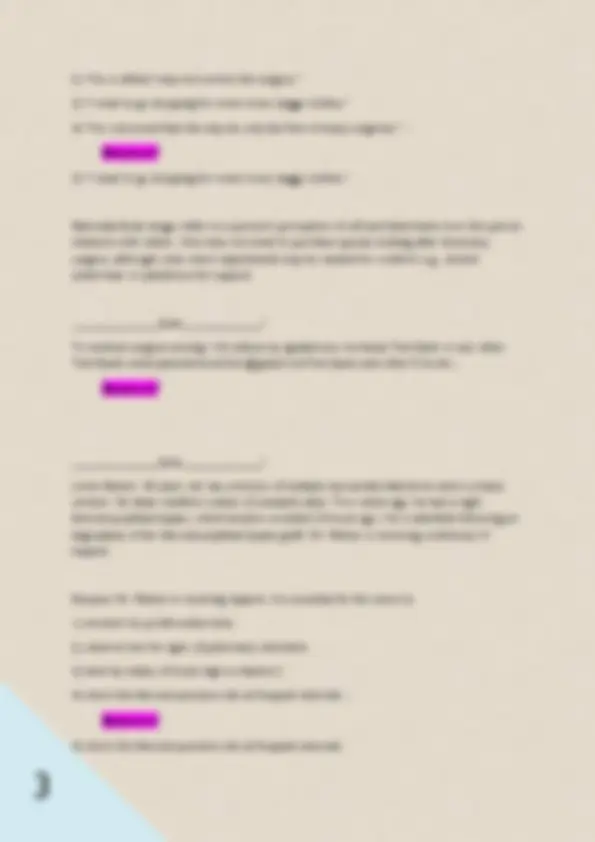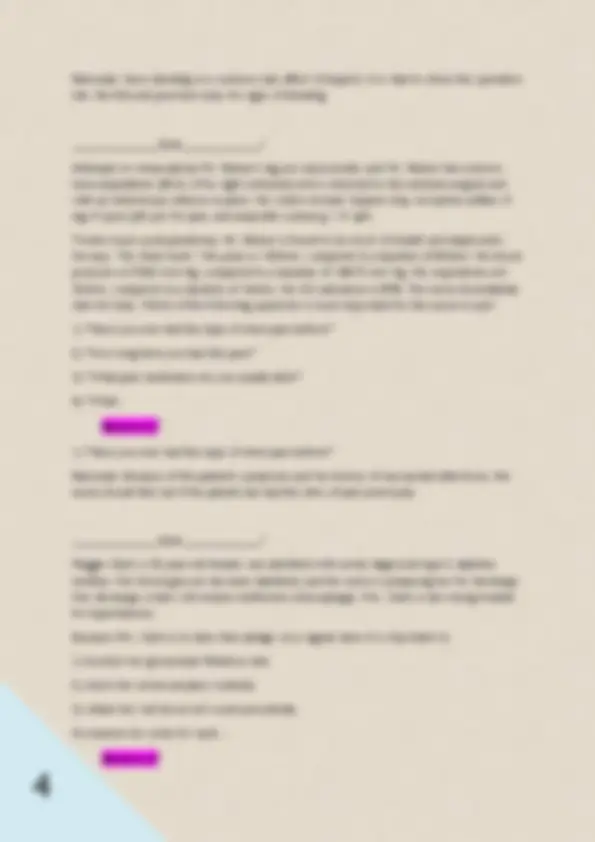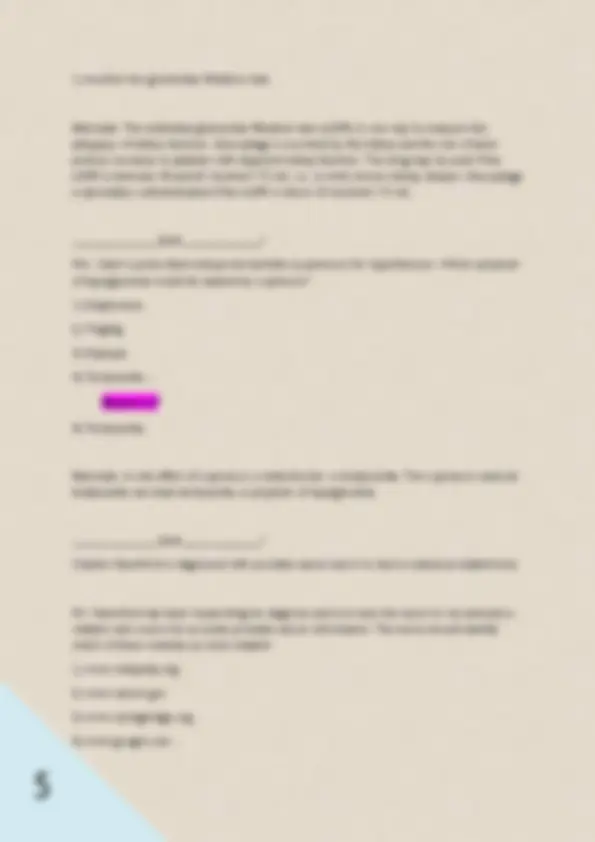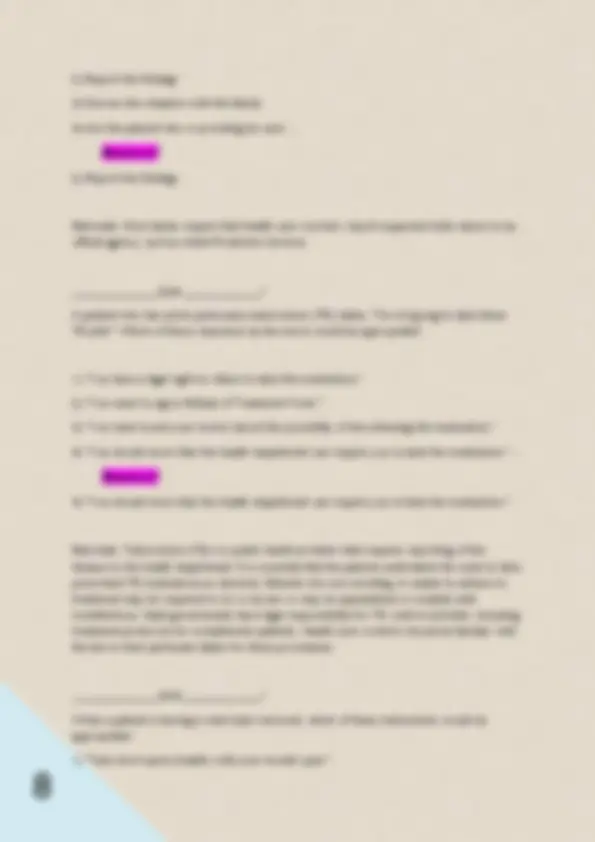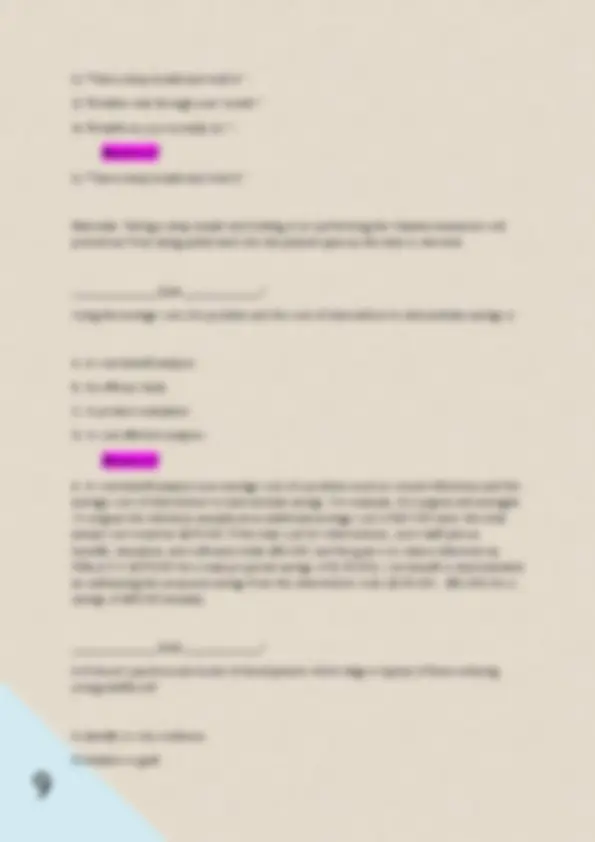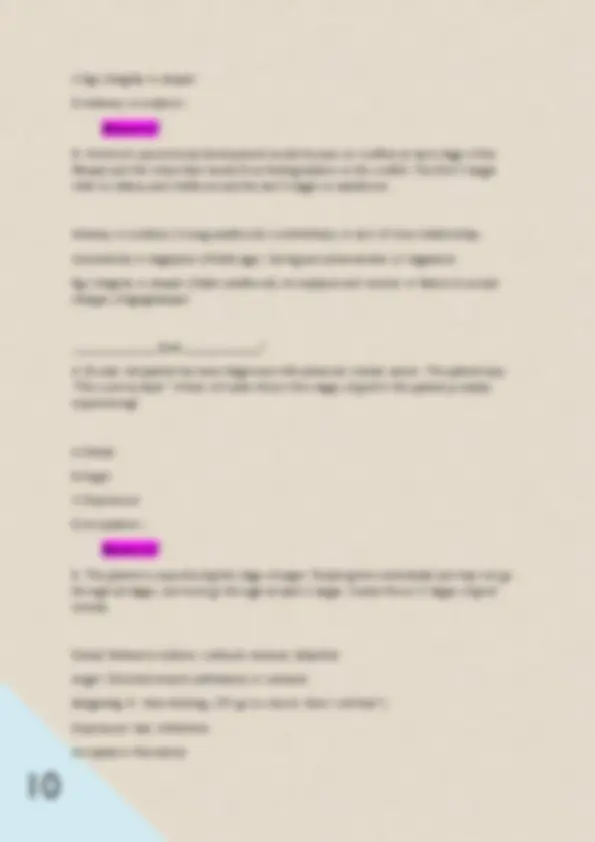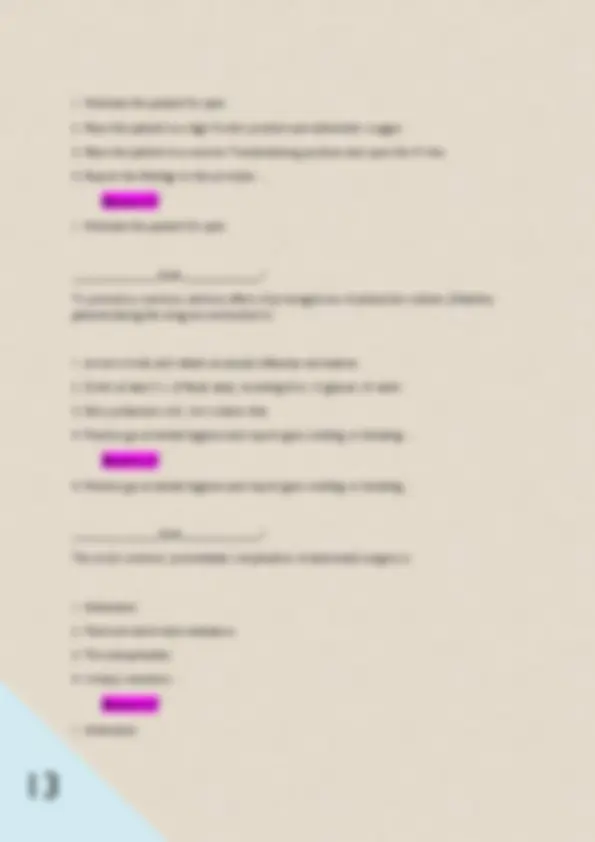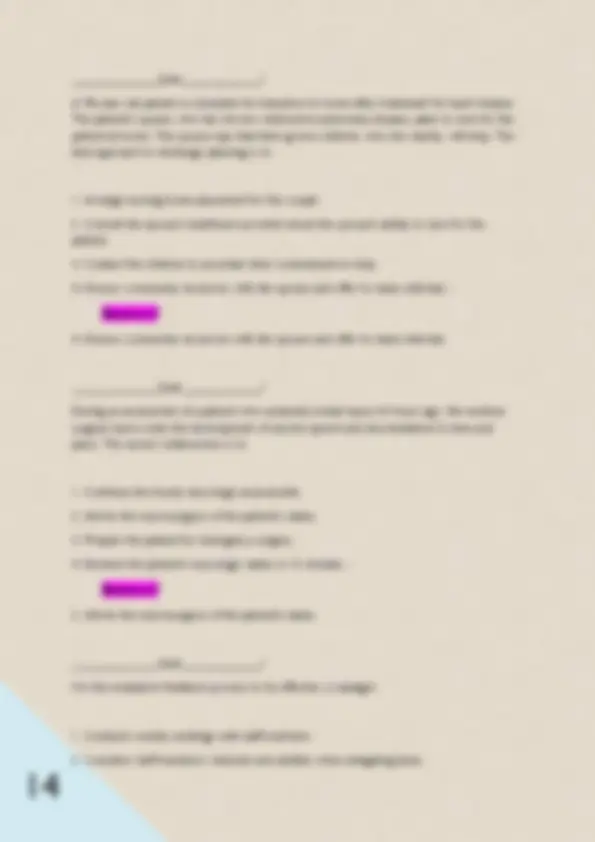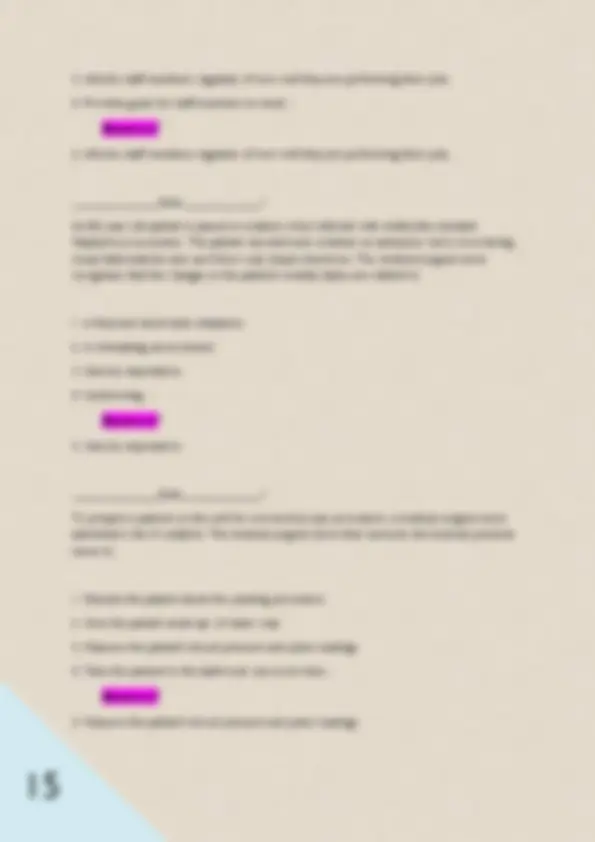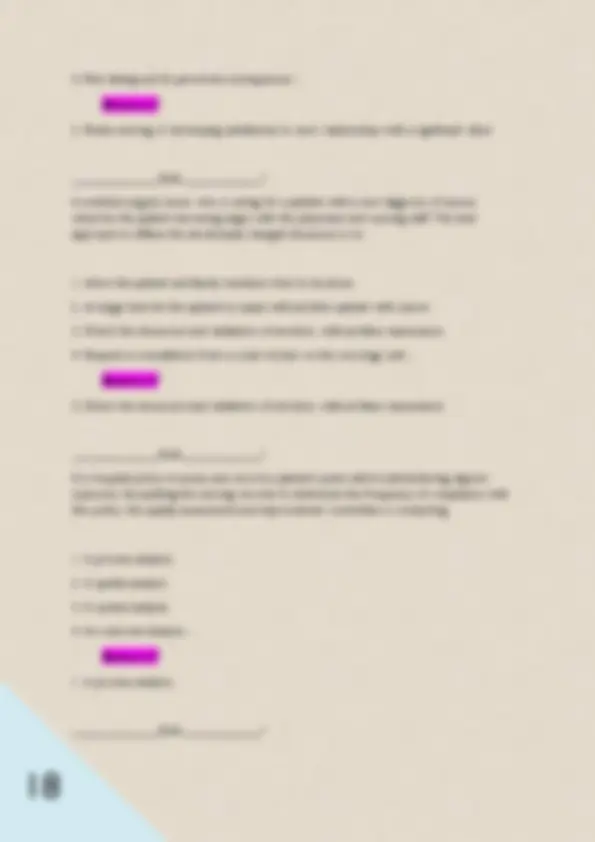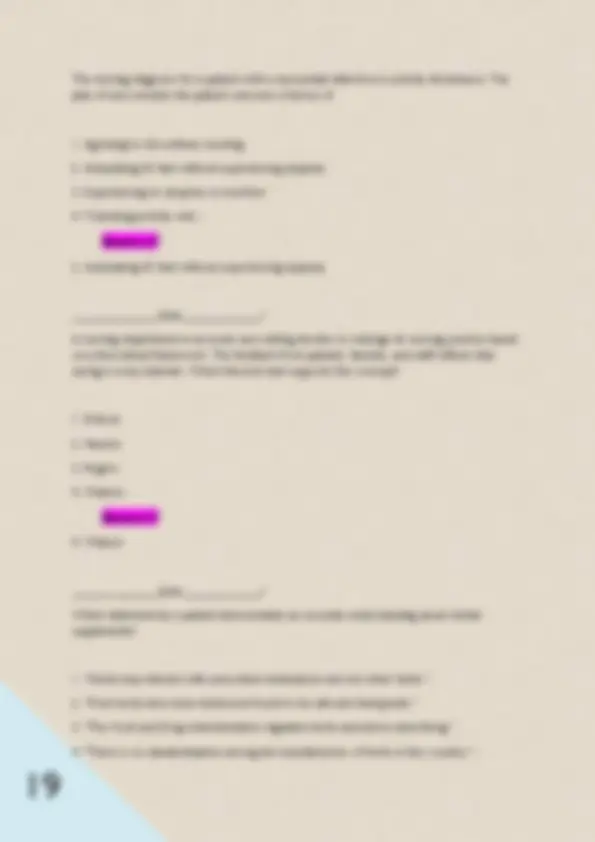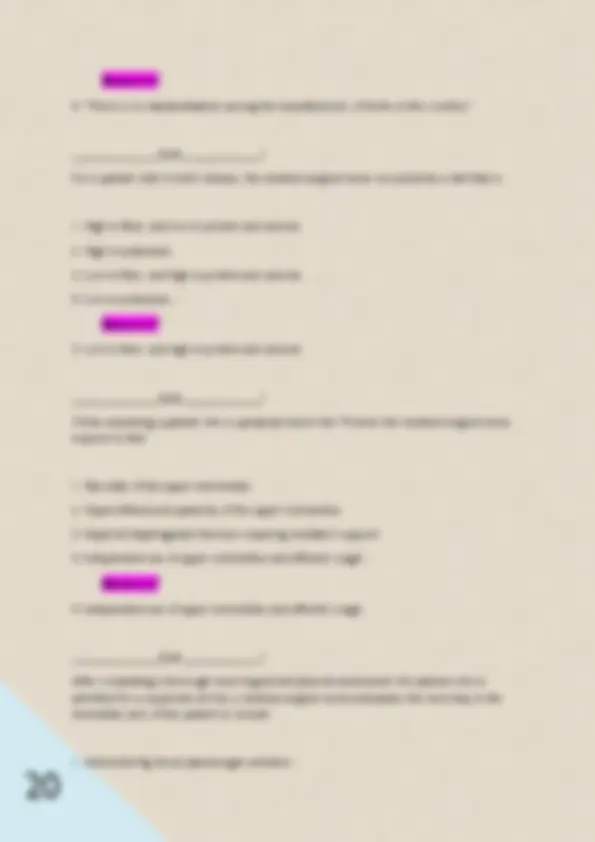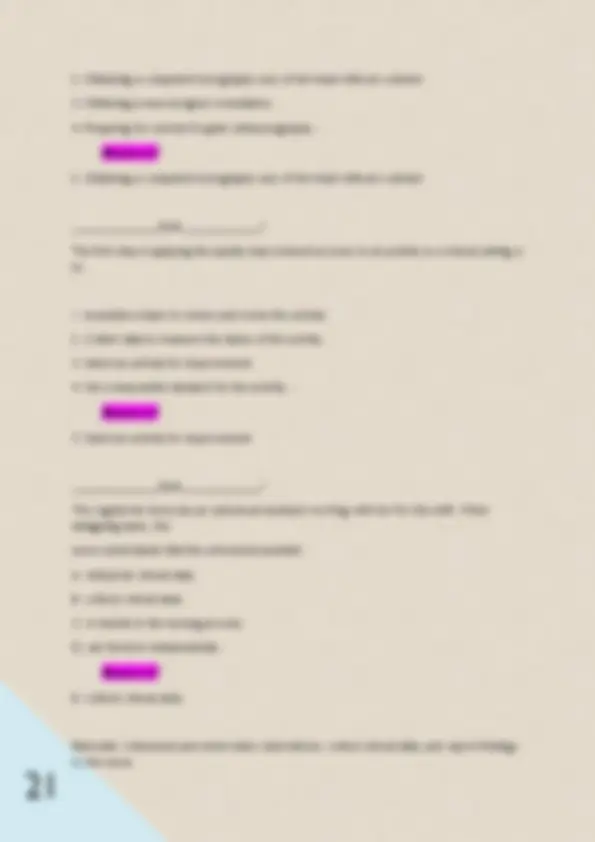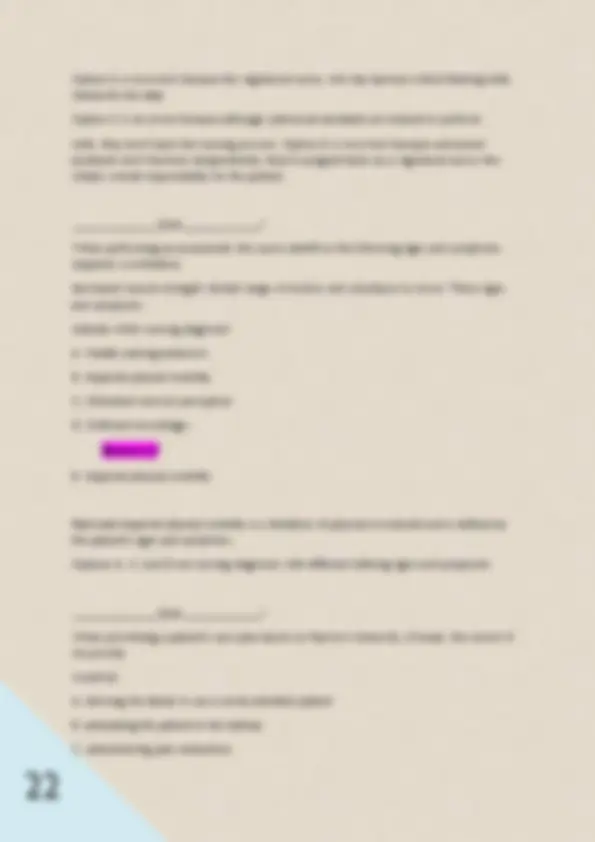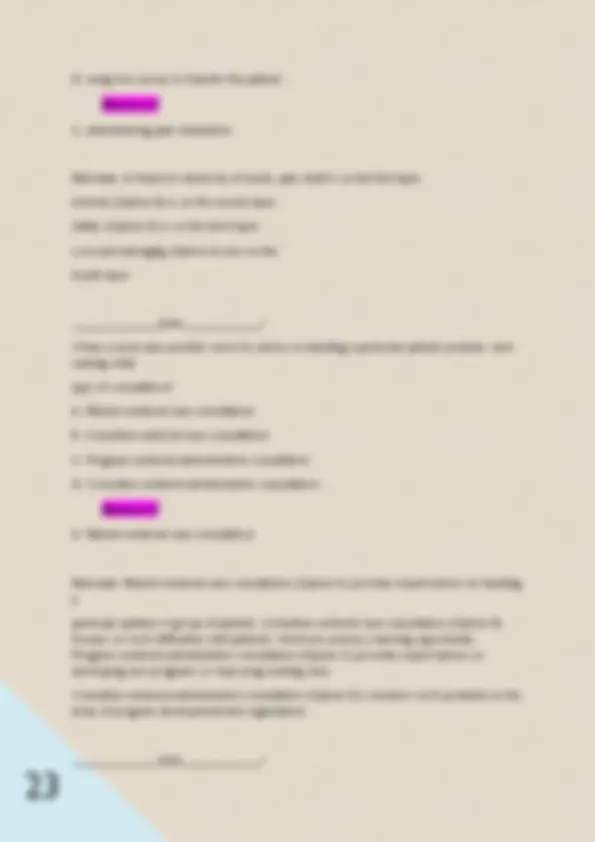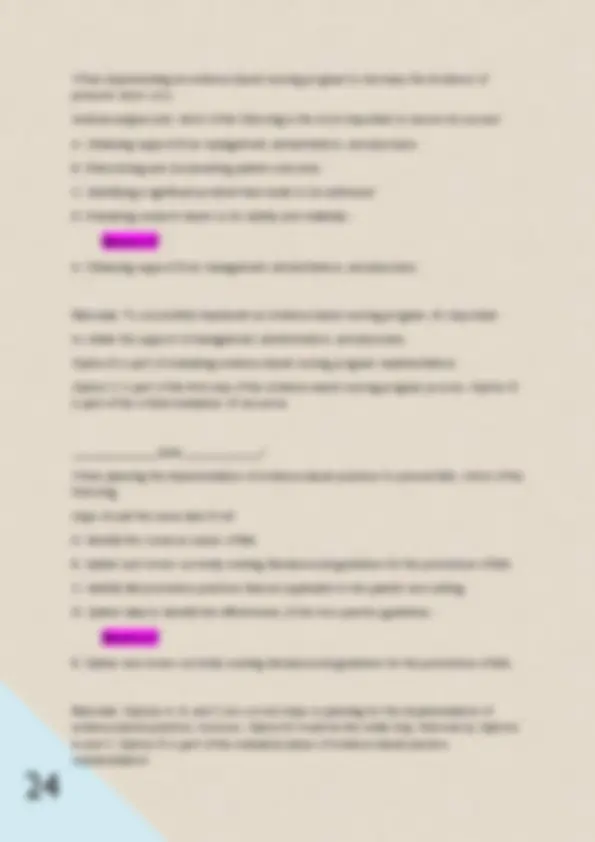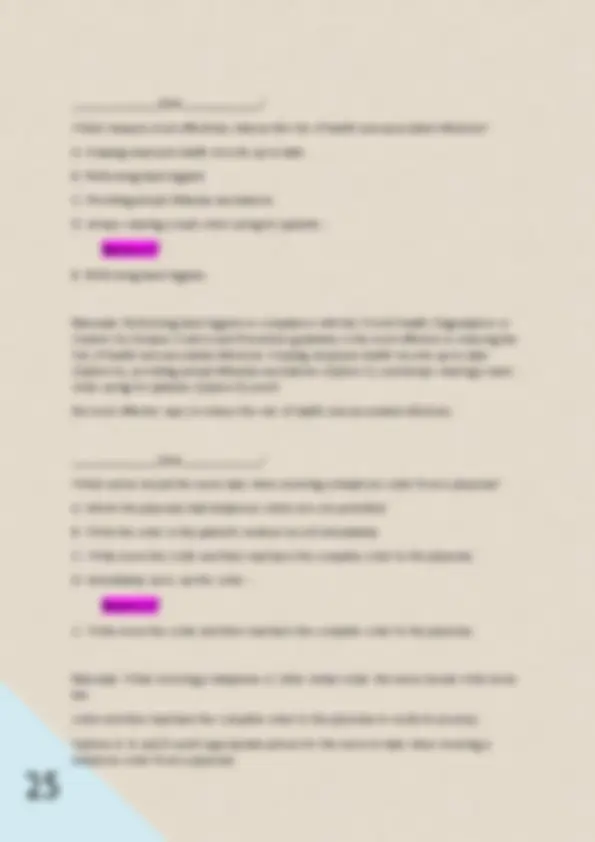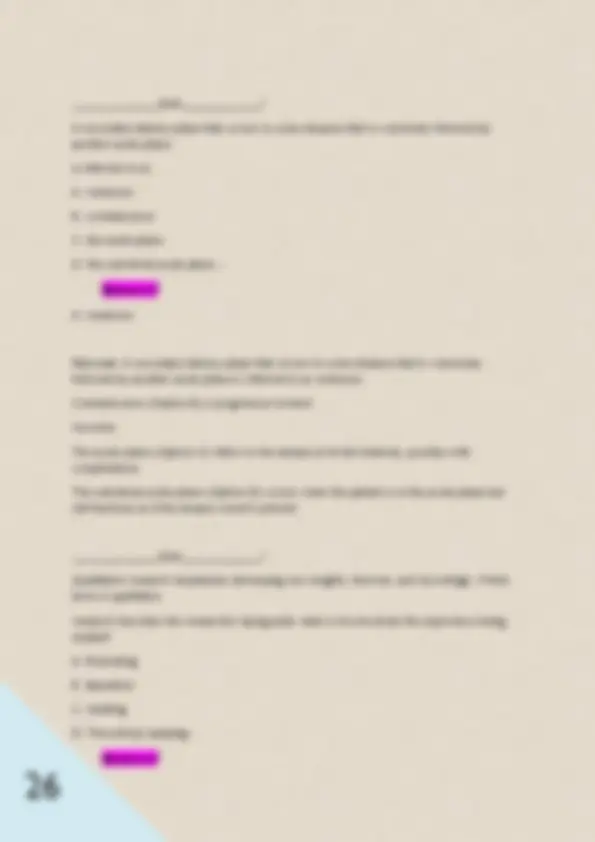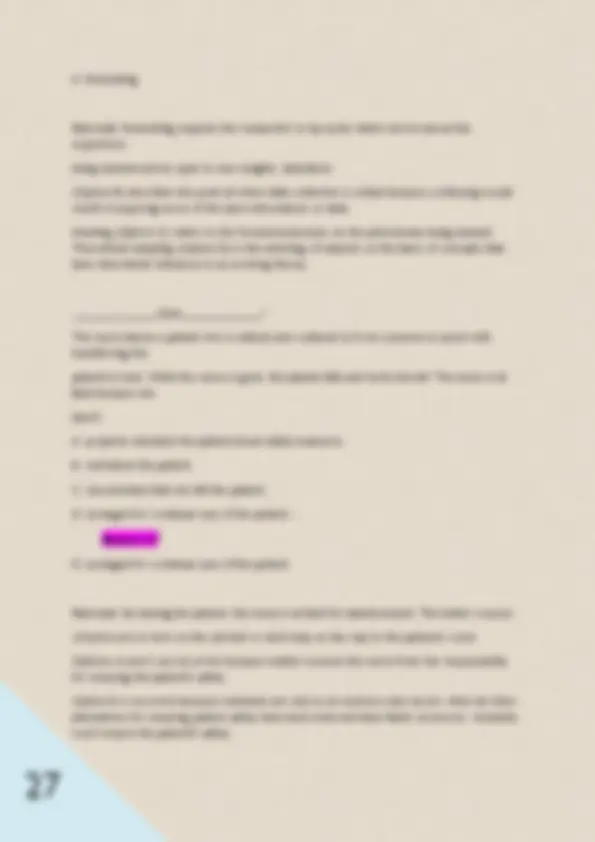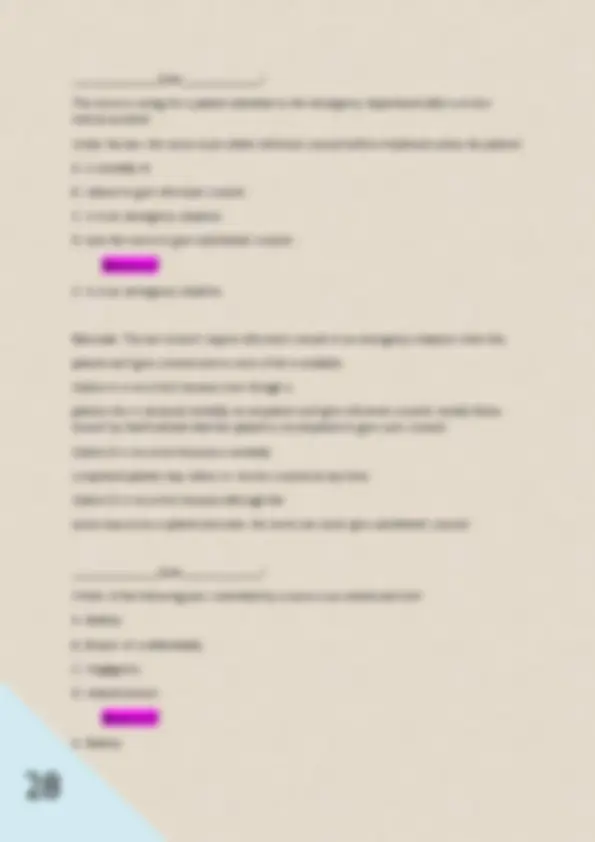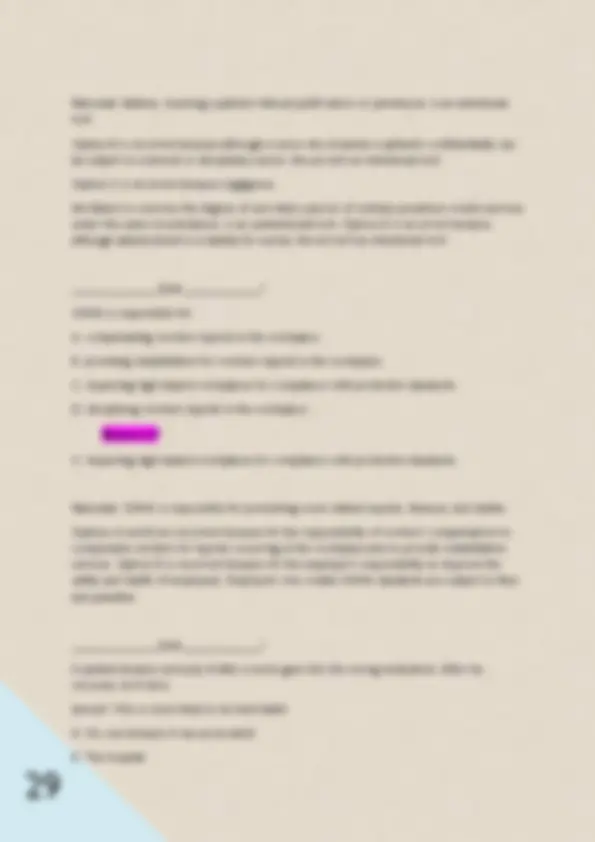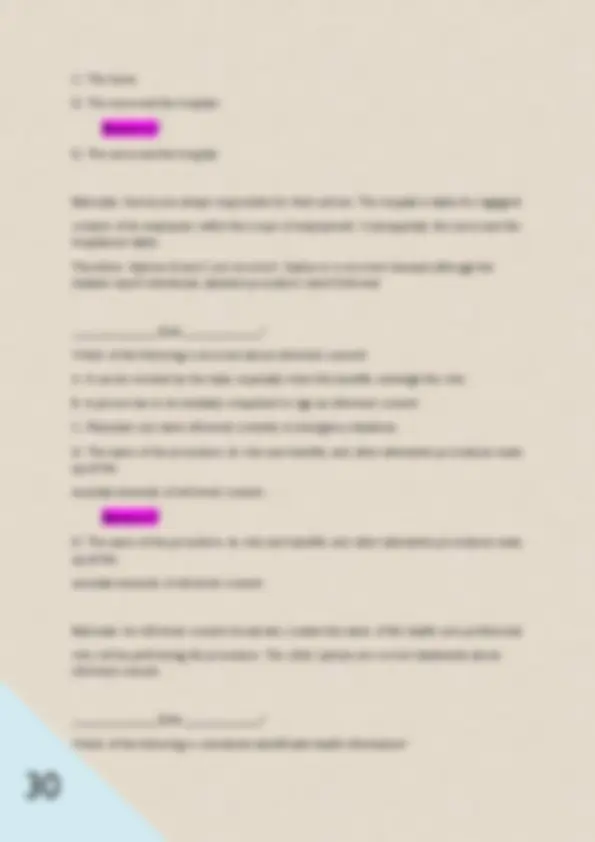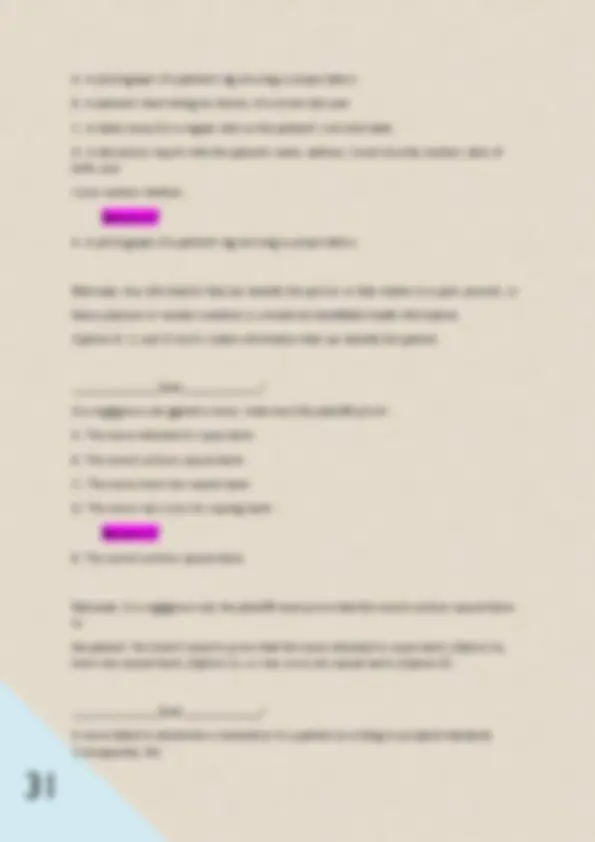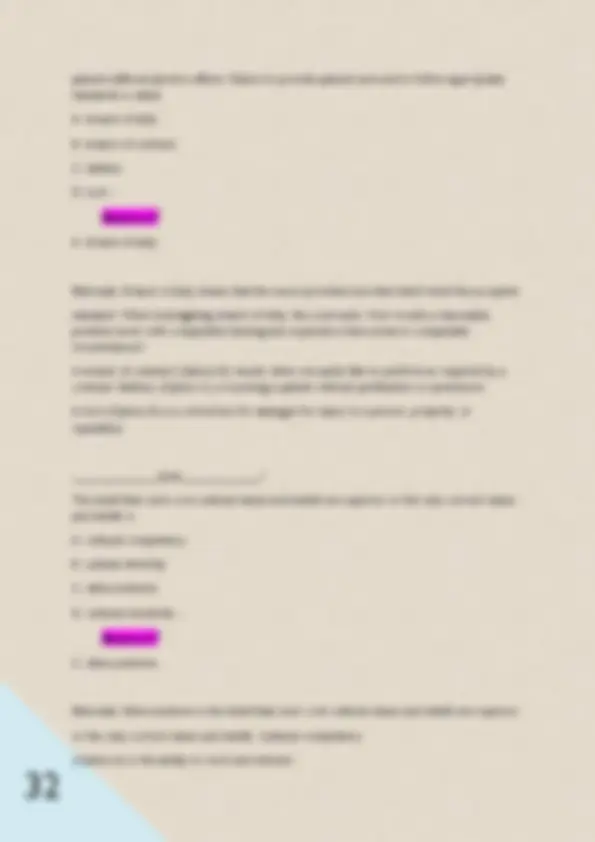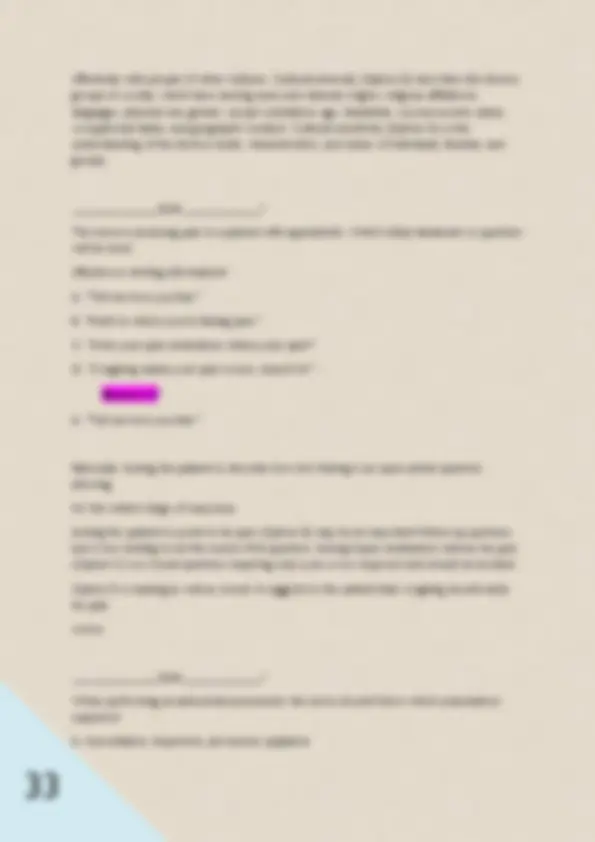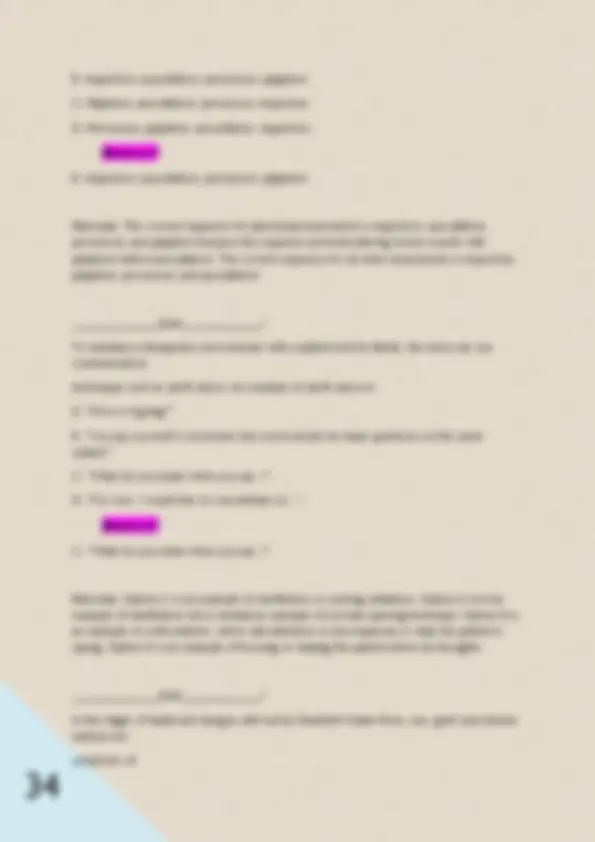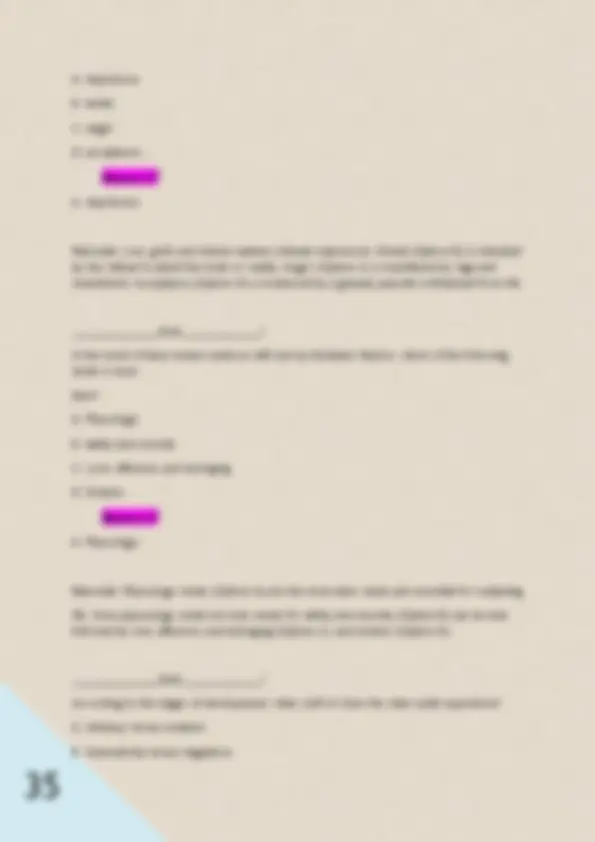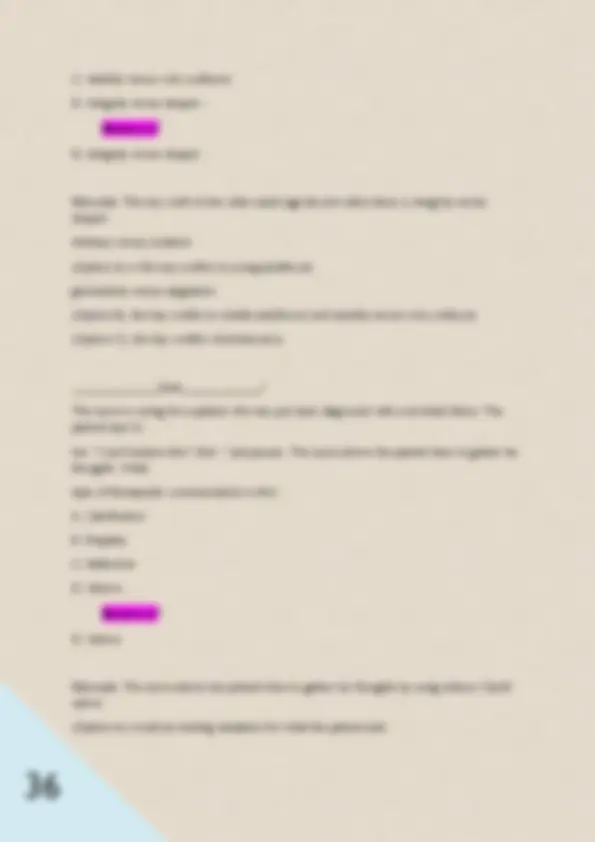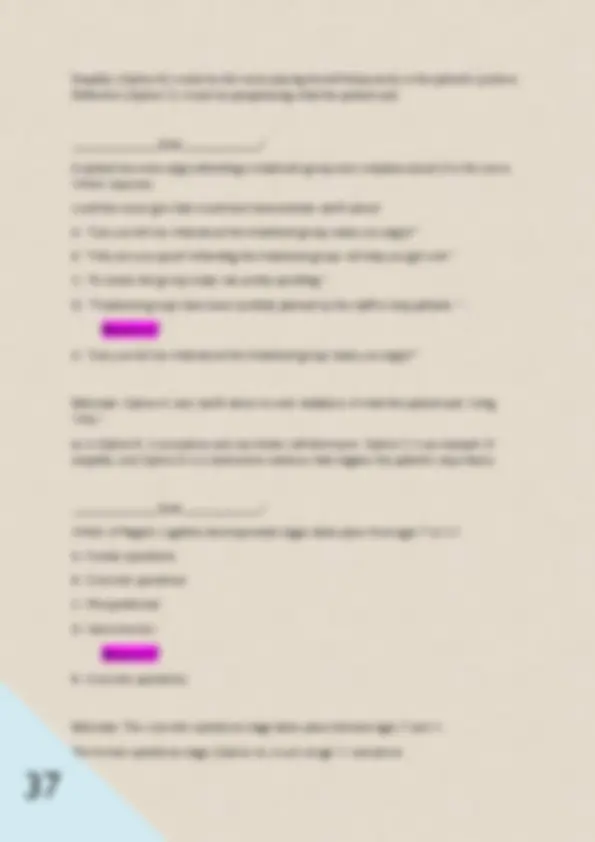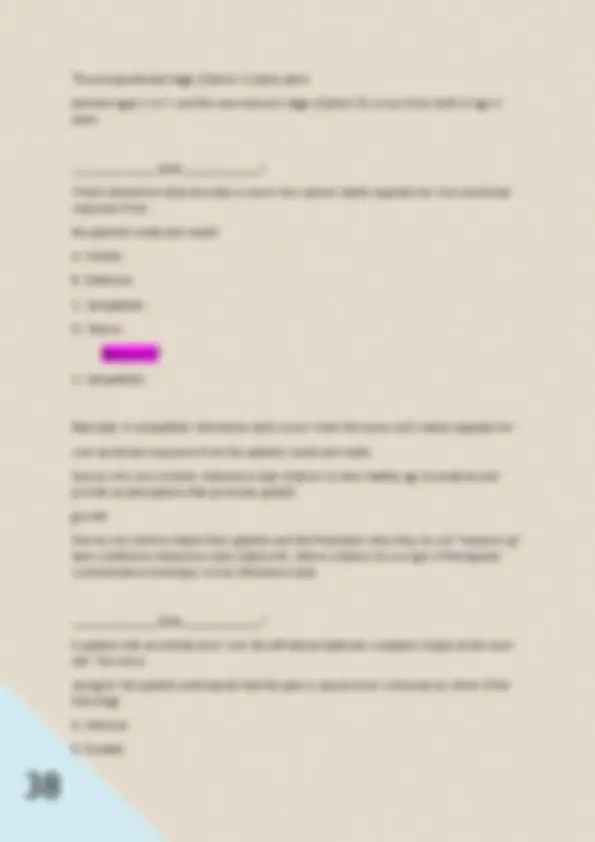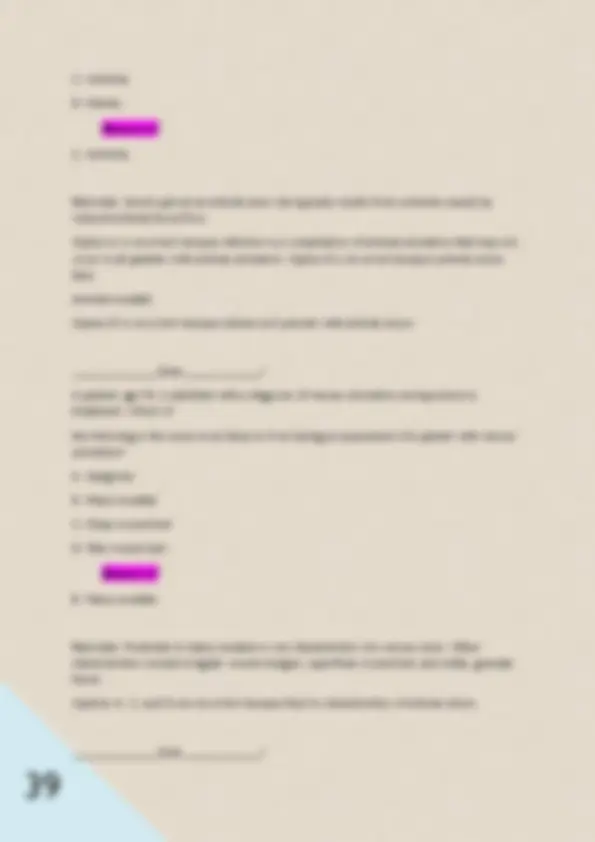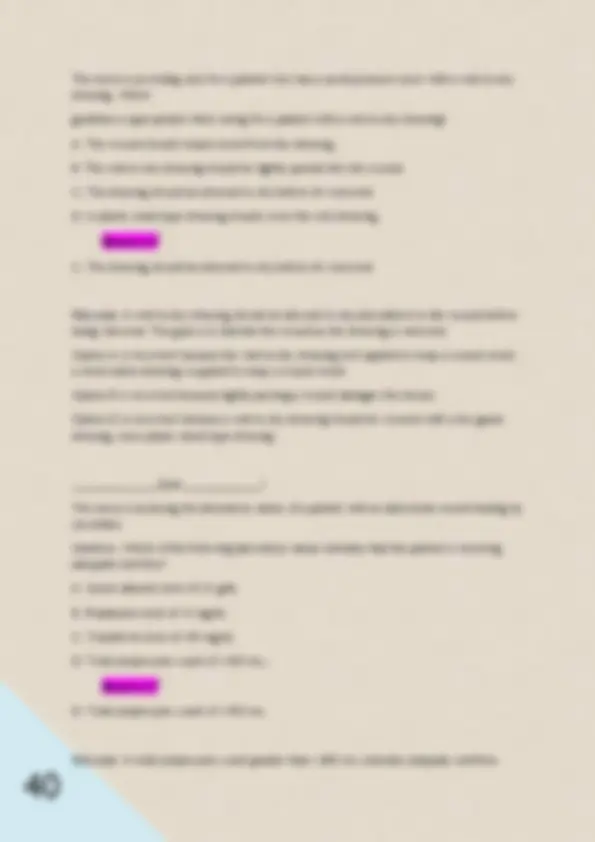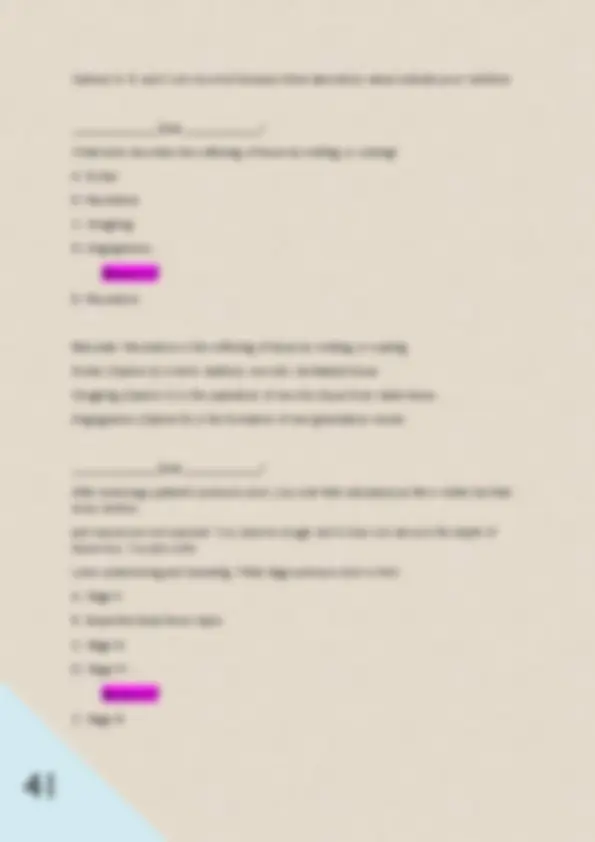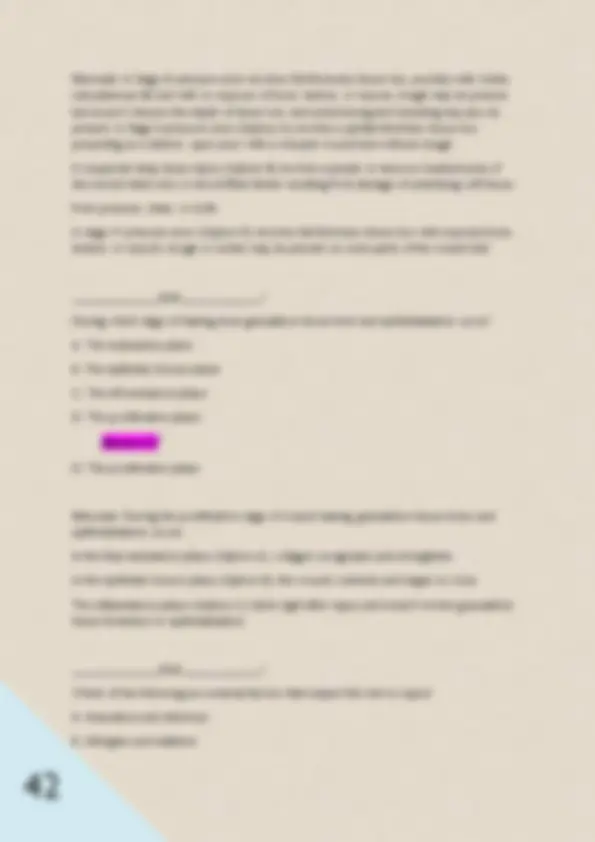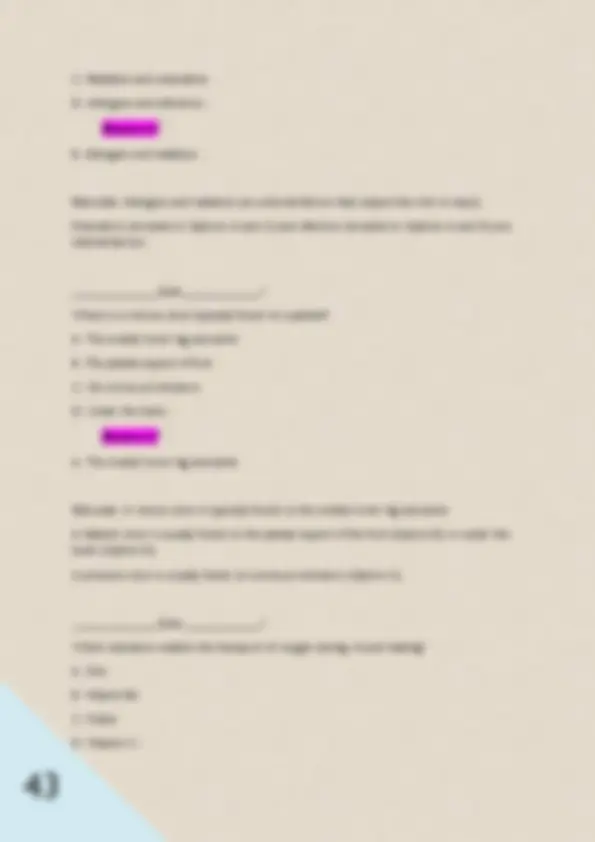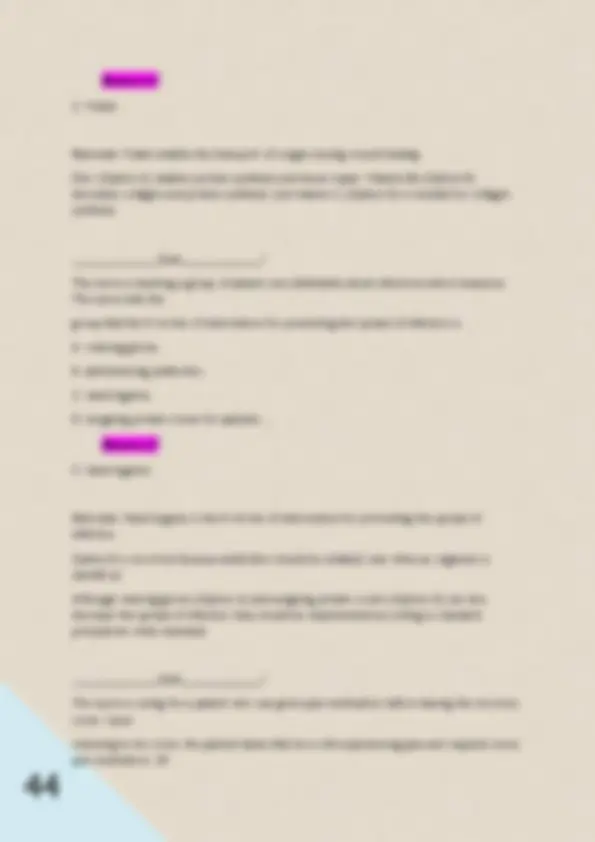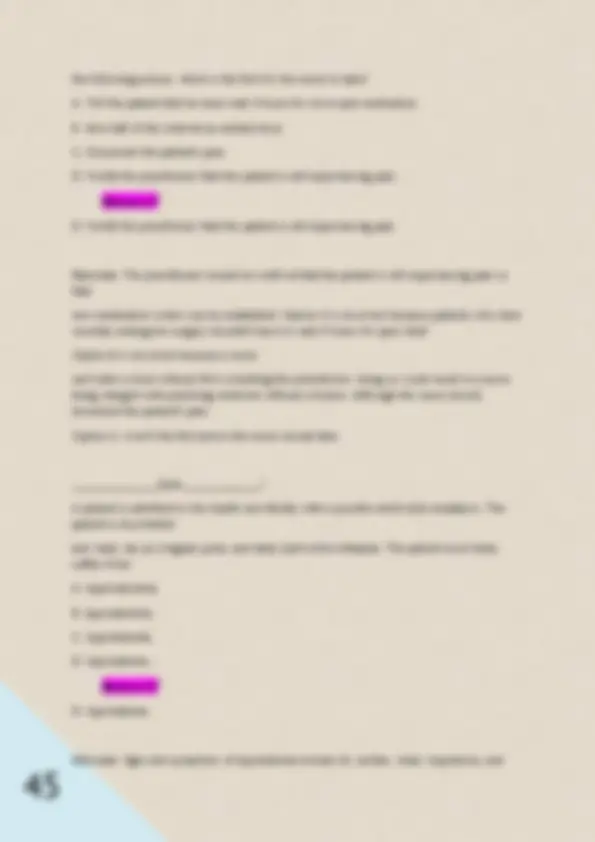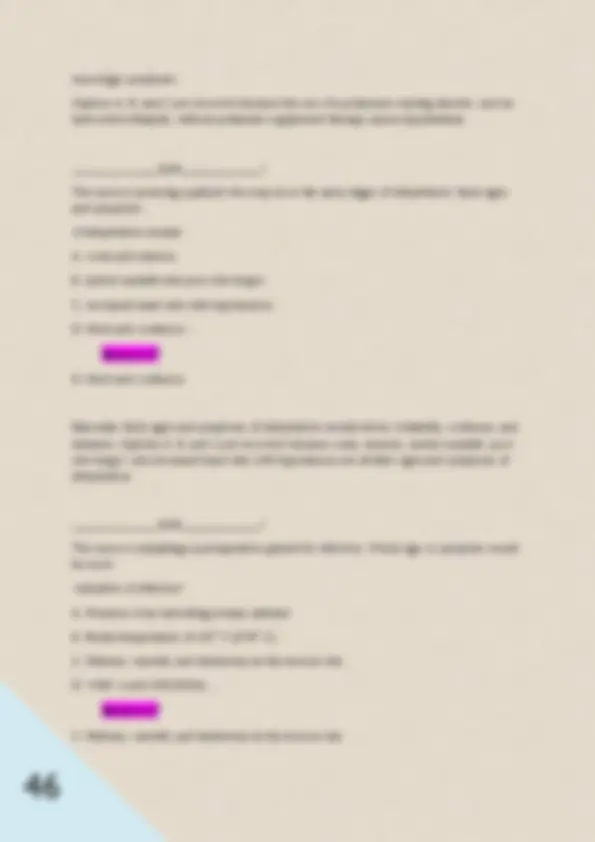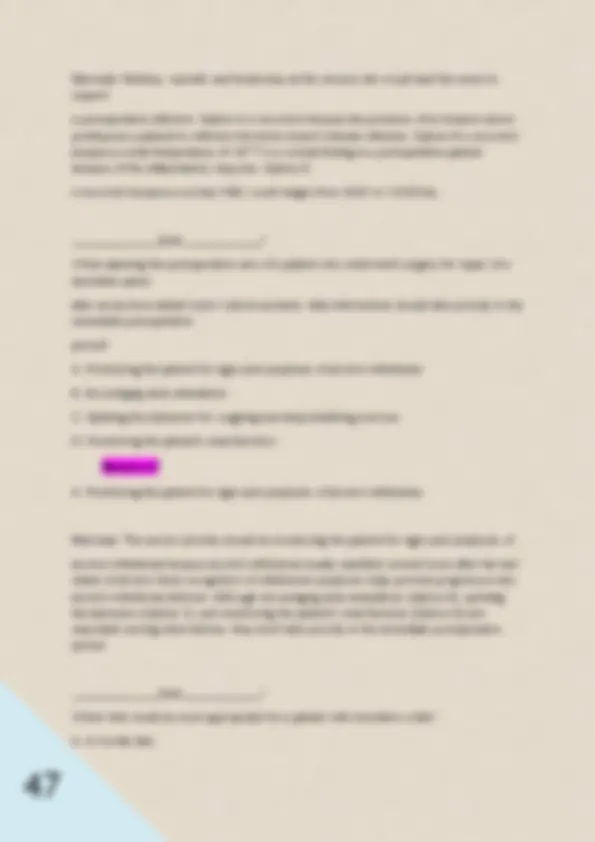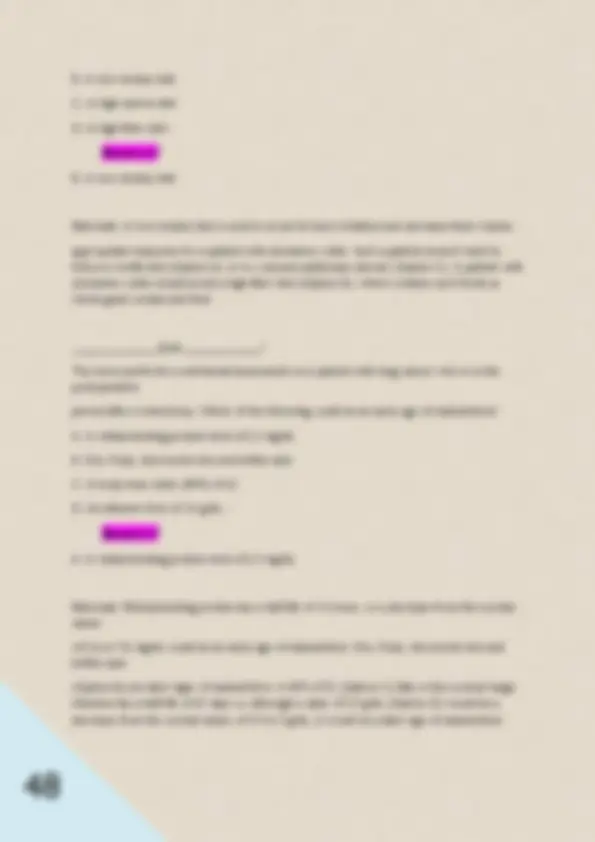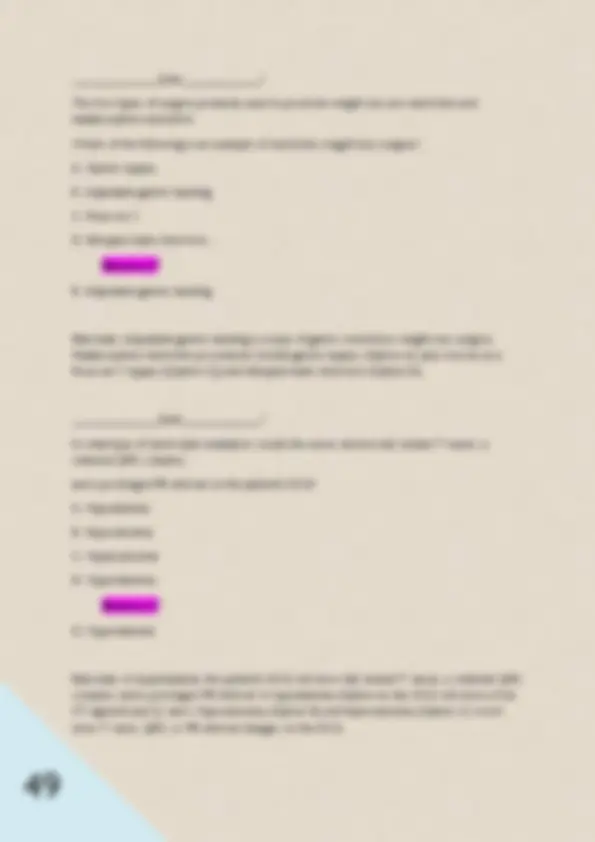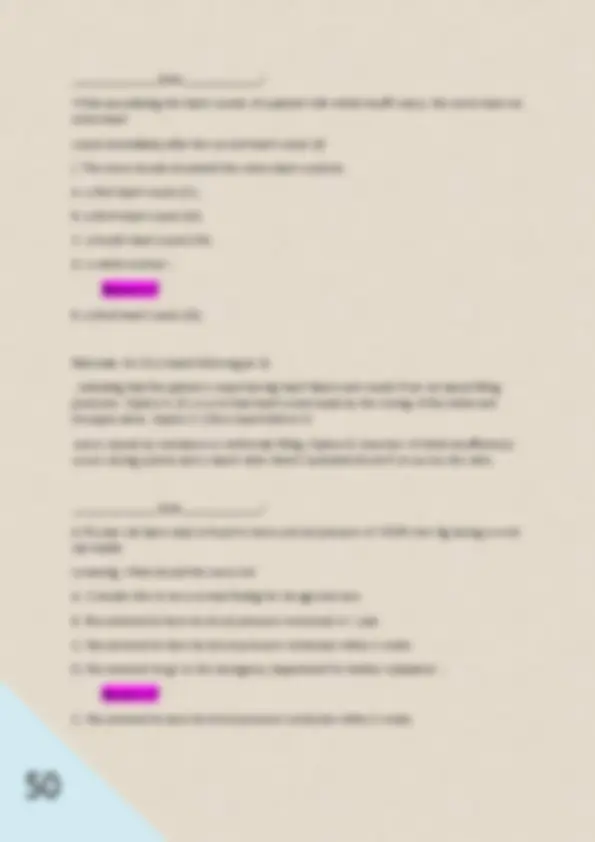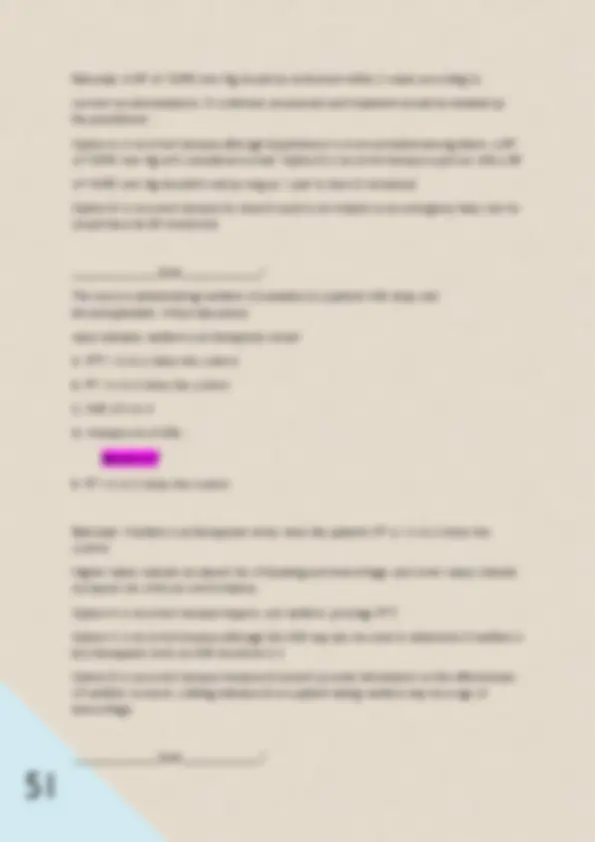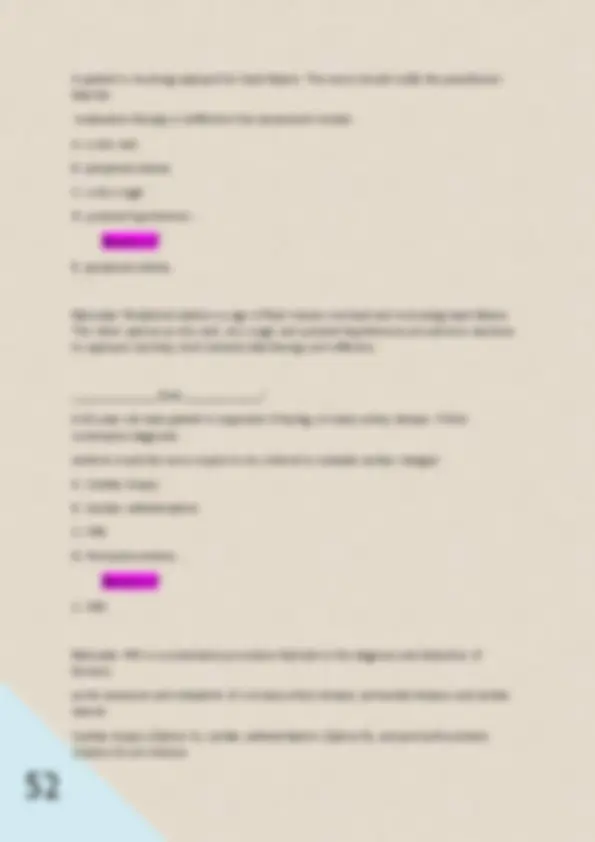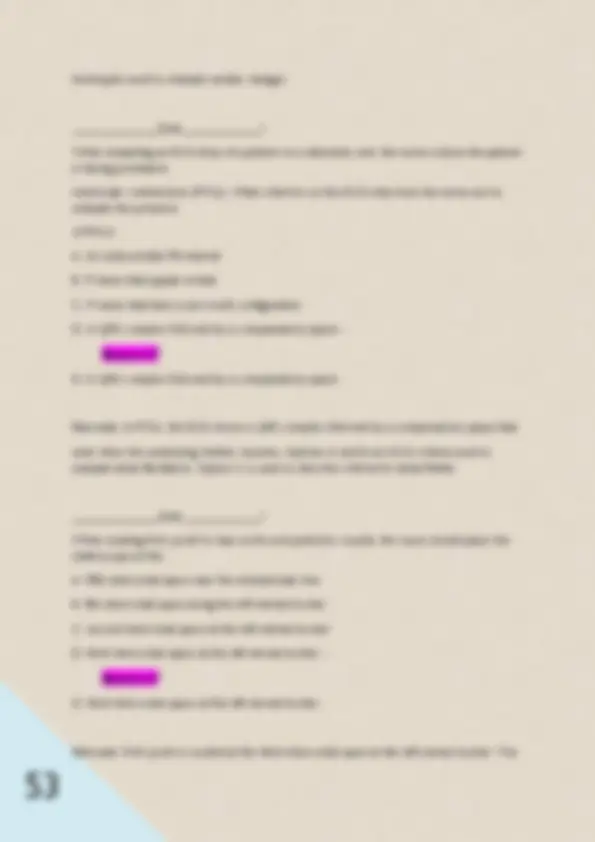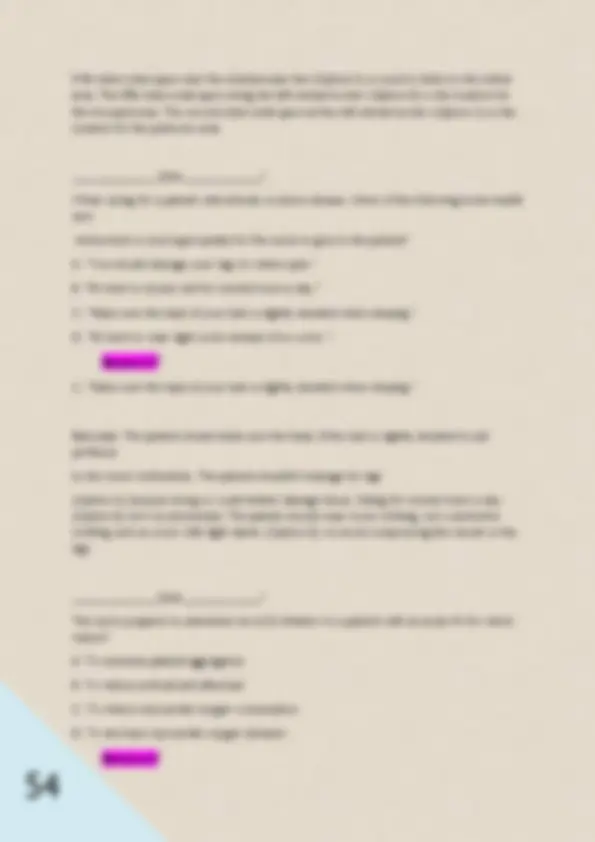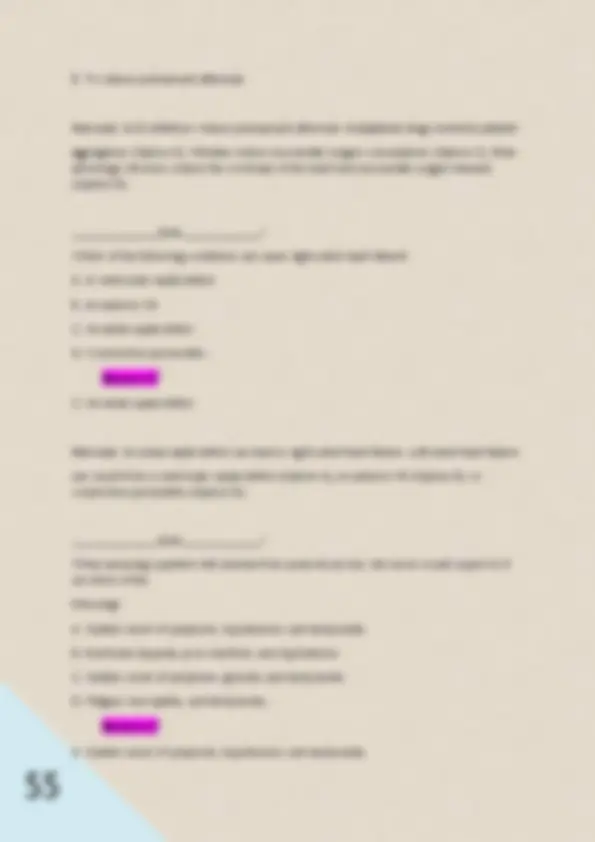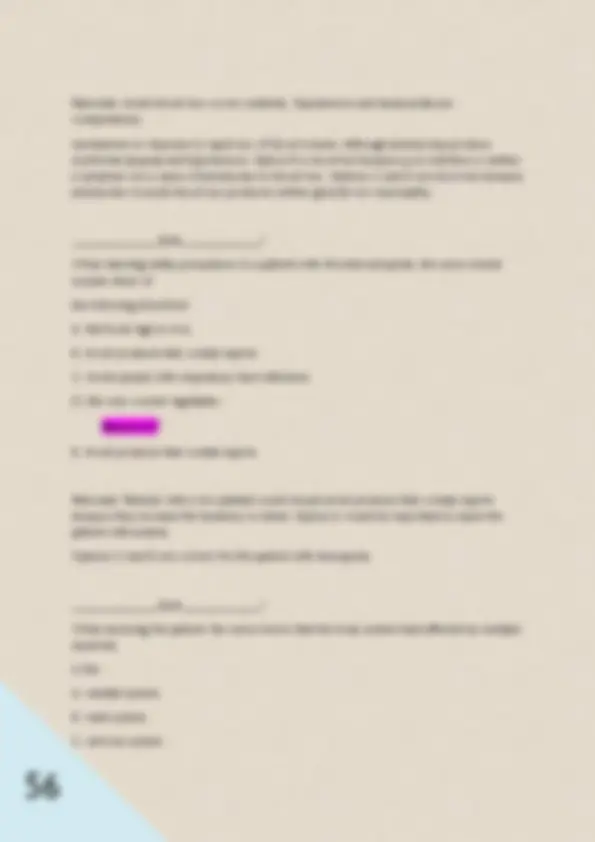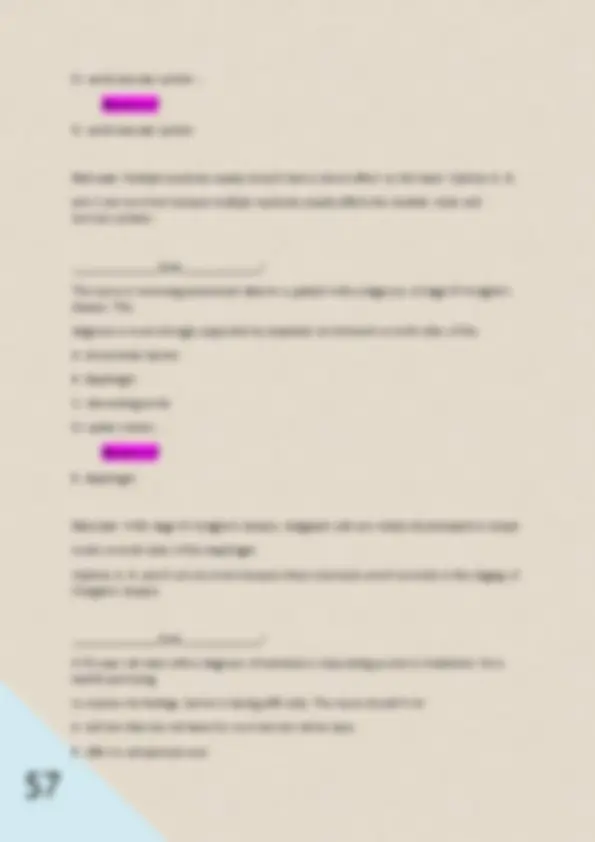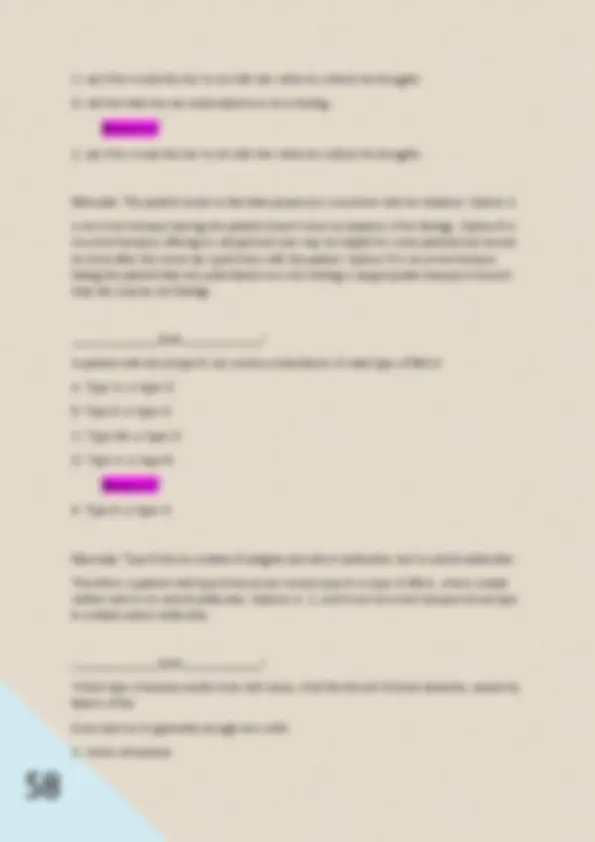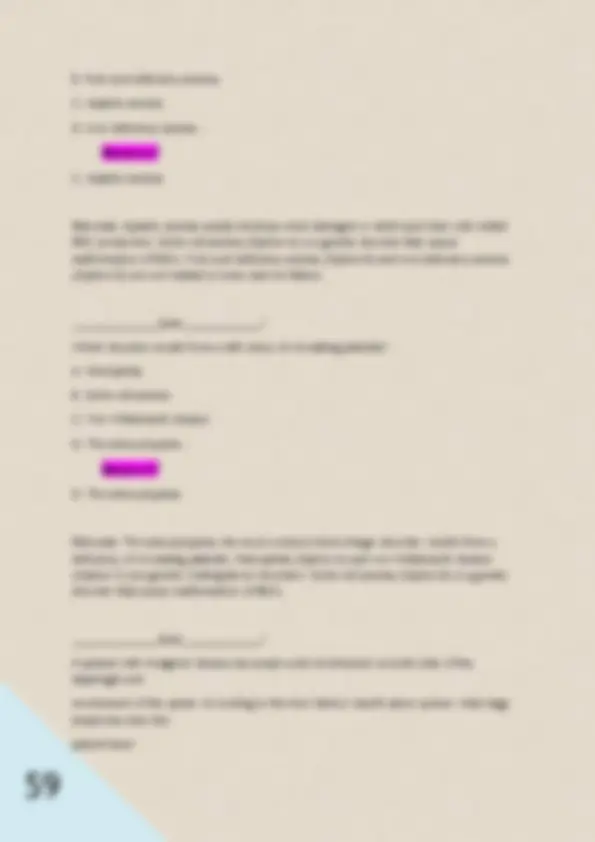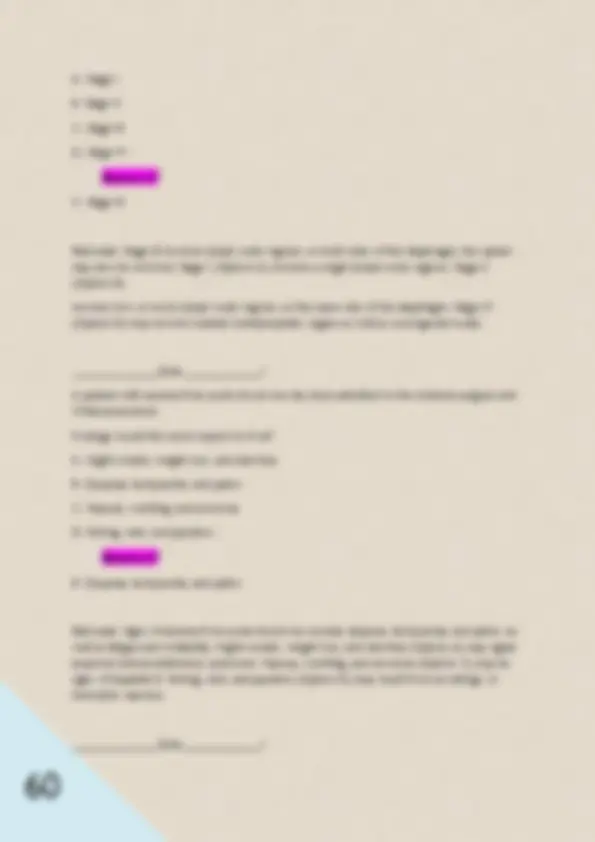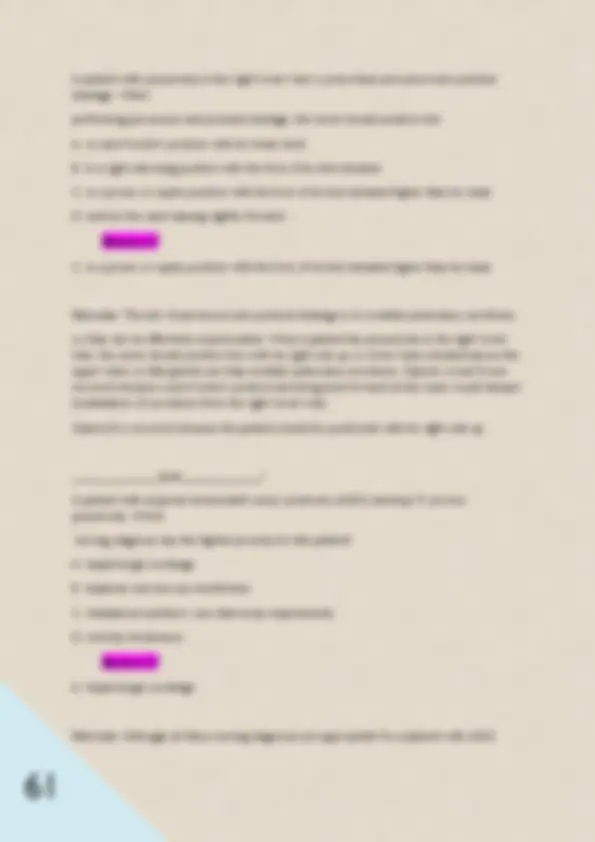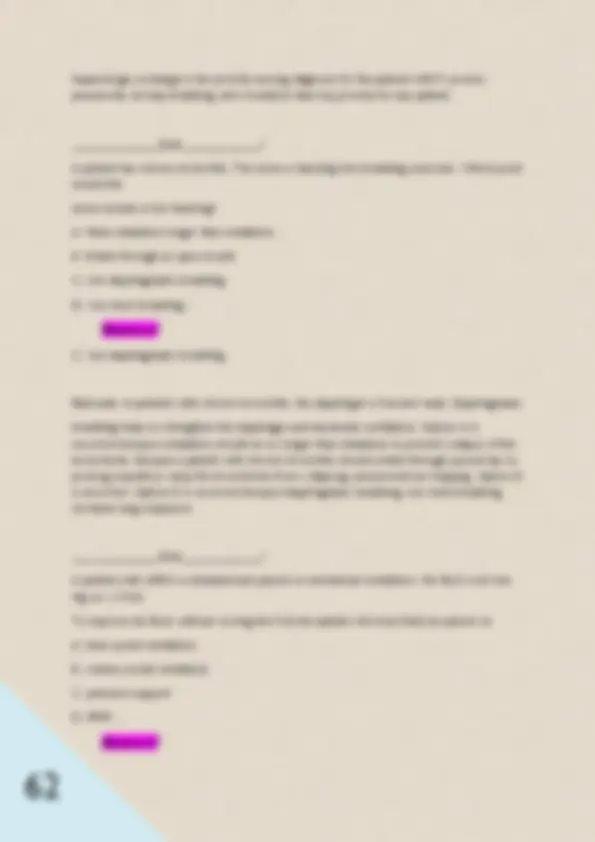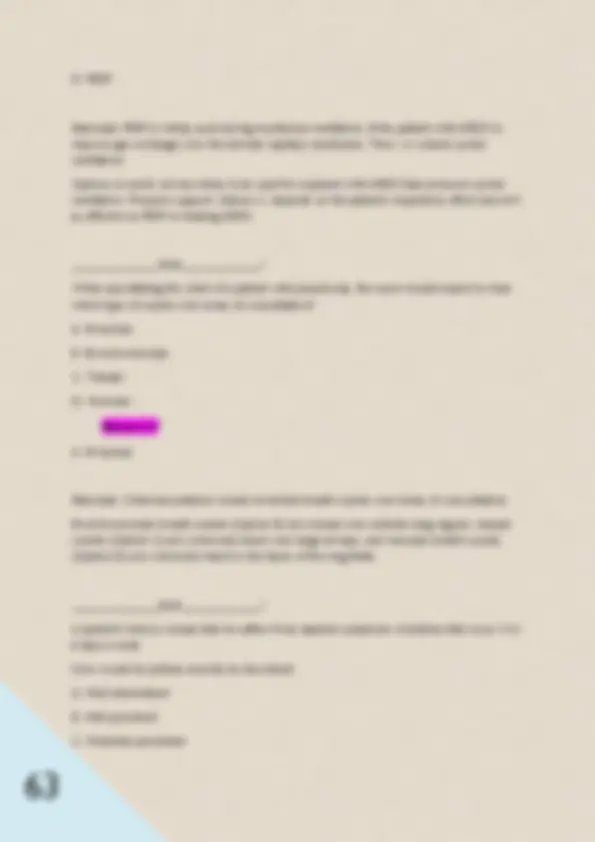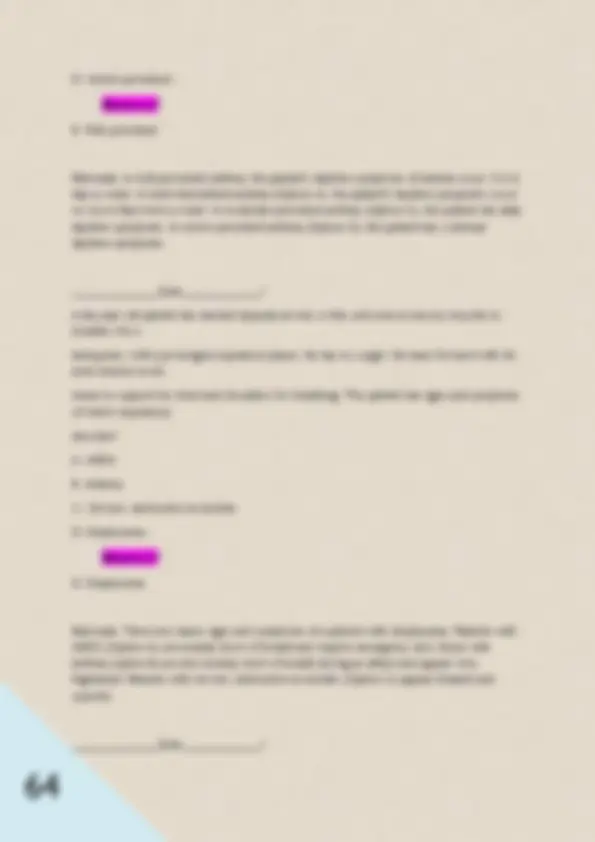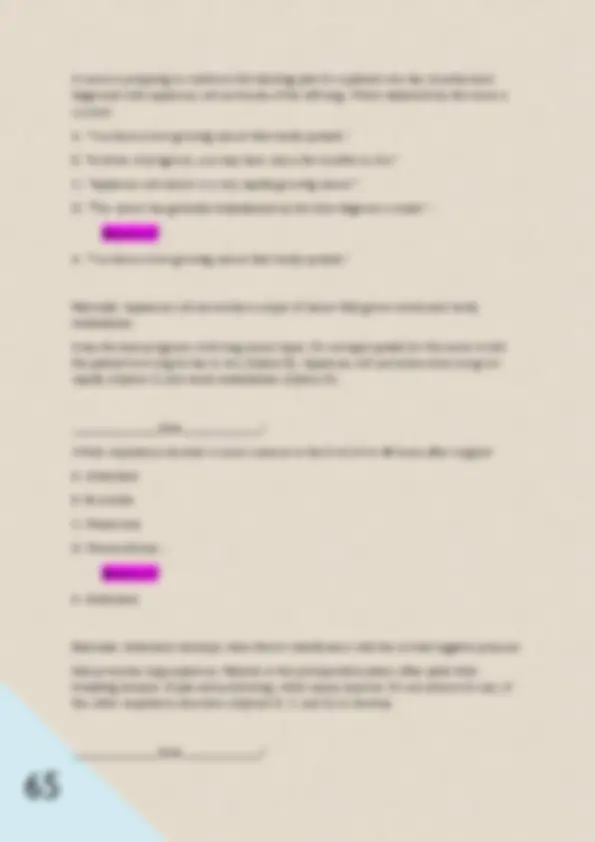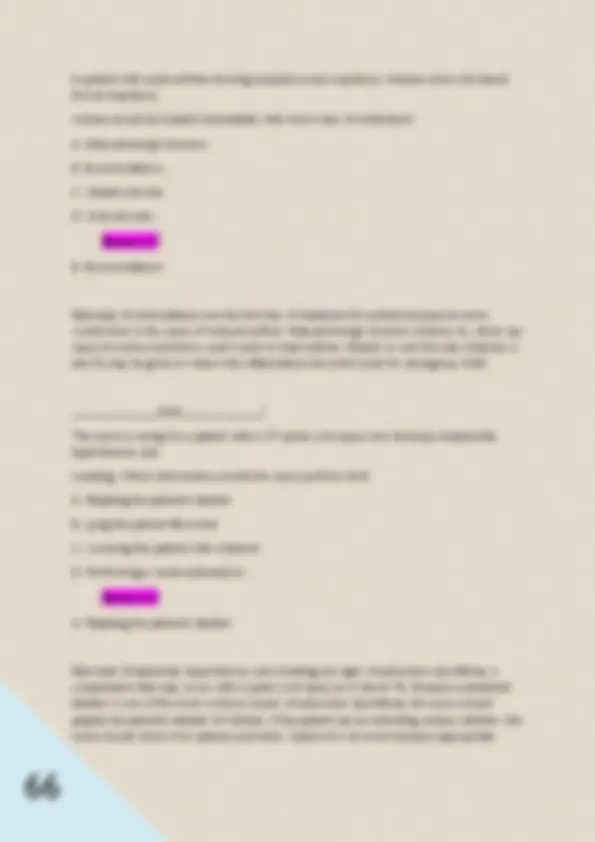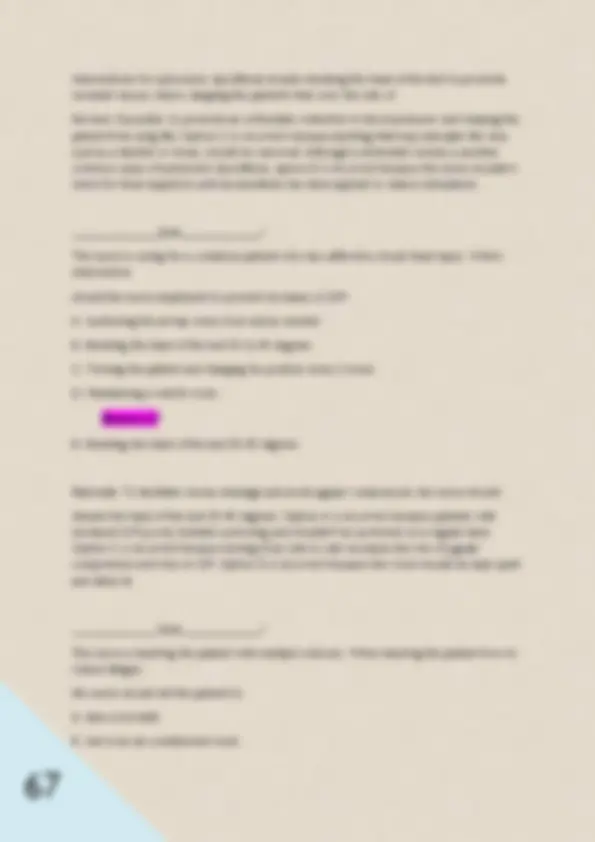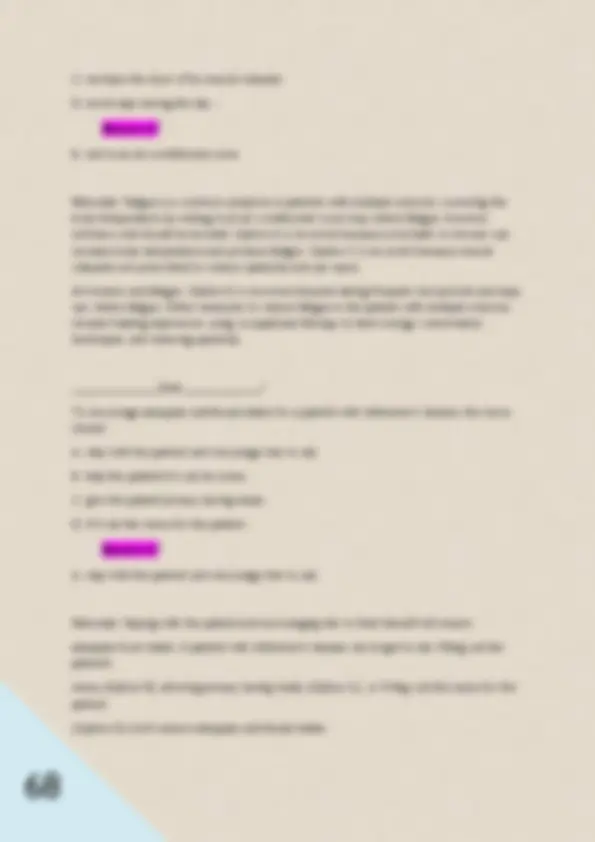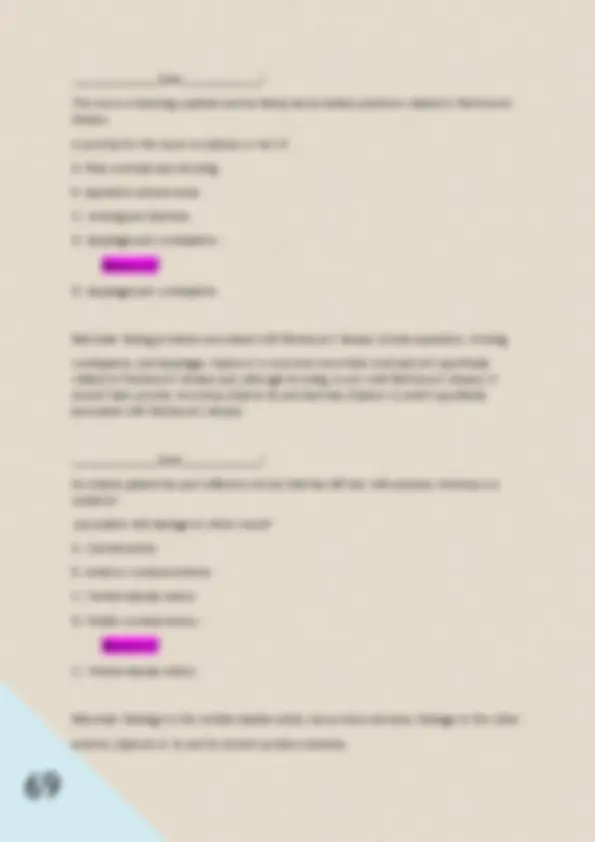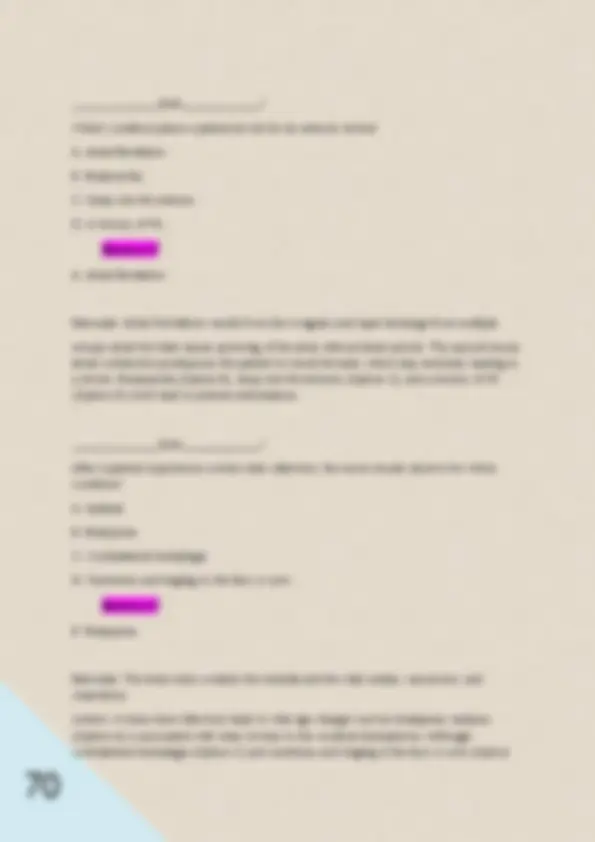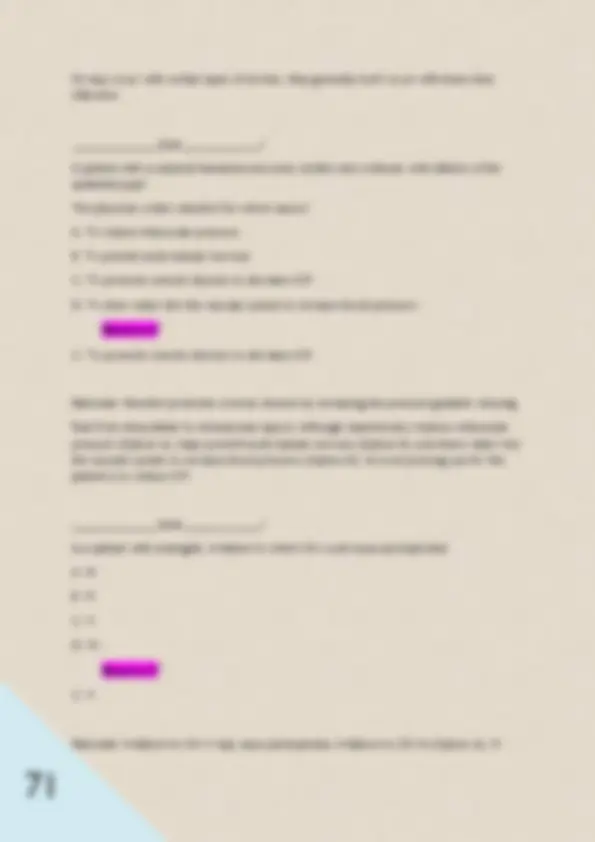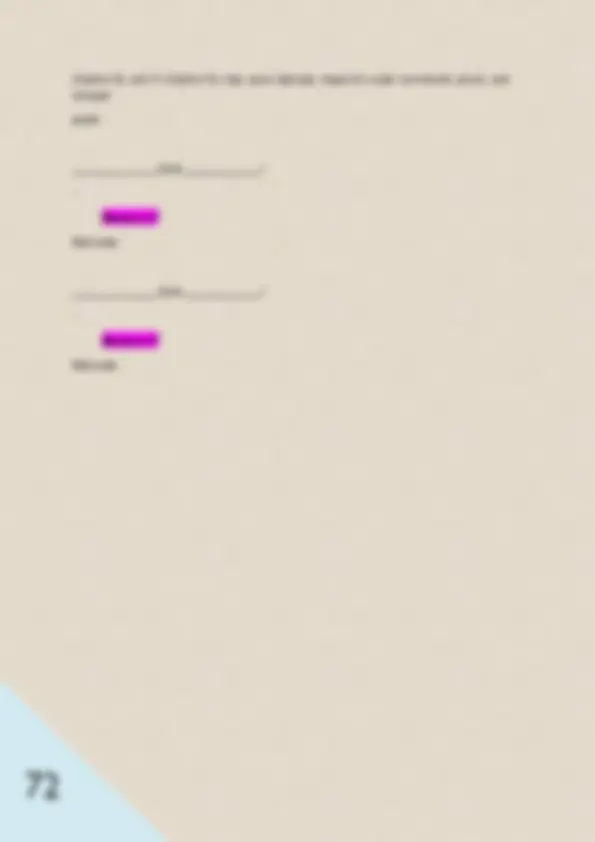Download Certified Medical-Surgical Registered Nurse 2025 Sample Questions / Certified Exam Q&A / 2 and more Exams Nursing in PDF only on Docsity!
Registered Nurse 2025 Sample
_____________Quiz____________? The nurse receives all of the following stat orders for Mr. Palmer. Which one should the nurse question?
- Oxygen per nasal cannula at 4 L per minute.
- Enoxaparin (Lovenox) 40 mg subcutaneously.
- Troponin level.
- Computed tomography (CT) angiogram. -
Answer ✓✓
Rationale: The nurse should questions the order for Lovenox because the patient is receiving a heparin drip. _____________Quiz____________? Christine Warren, 45 years old, has a long history of ulcerative colitis, and non-surgical treatment no longer relieved her symptoms. She underwent a total proctocolectomy and a permanent ileostomy 12 hours ago. The nurse should contact the physician immediately if Mrs. Warren has which of these findings?
- The stoma appears pale and dry.
- The stoma appears red and shiny.
- There is 200 mL of dark green output from the stoma.
- There is 50 mL of serosanguinous drainage from the stoma. -
Answer ✓✓
- The stoma appears pale and dry. Rationale: If there is an adequate blood supply to the stoma, the color is pink or red, and the stoma is moist as a result of mucous production. A pale dry color suggests ischemia of the stoma or bowel and must be reported immediately to the physician. With an ileostomy initially after surgery, the output is a loose, dark green liquid that may contain some blood. The ileostomy usually begins to drain within 24 of surgery at more than one liter per day. _____________Quiz____________? When changing Mrs. Warren's ileostomy bag, the nurse notices that the peristomal skin is irritated. Which of these actions by the nurse would be appropriate before reapplying the appliance?
- Wash the area with antiseptic soap and water.
- Clean the site with Dakin's solution.
- Use a solid skin barrier.
- Obtain an order for a topical antibiotic. -
Answer ✓✓
- Use a solid skin barrier. Rationale: The drainage from the stoma can quickly irritate the surrounding tissue. Therefore, a solid skin barrier, with a pectin base or karaya wafer that has a measurable thickness and hydrocolloid adhesive properties, should be applied. _____________Quiz____________? Which of these comments, if made by Mrs. Warren before her surgery, would indicate that she had concerns about her body image?
- "I will have to stop my aerobics classes."
Rationale: Since bleeding is a common side effect of heparin, it is vital to check the operative site, the femoral puncture area, for signs of bleeding. _____________Quiz____________? Attempts to revascularize Mr. Palmer's leg are unsuccessful, and Mr. Palmer has a below- knee amputation (BKA) of his right extremity and is returned to the medical-surgical unit with an intravenous infusion in place. His orders include: heparin drip, morphine sulfate 10 mg IV push q4h prn for pain, and ampicillin sodium g 1 IV q6h. Twelve hours postoperatively, Mr. Palmer is found to be short of breath and diaphoretic. He says, "My chest hurts." His pulse is 140/min, compared to a baseline of 80/min. His blood pressure is105/60 mm Hg, compared to a baseline of 138/70 mm Hg. His respirations are 32/min, compared to a baseline of 16/min. His O2 saturation is 85%. The nurse immediately calls for help. Which of the following questions is most important for the nurse to ask?
- "Have you ever had this type of chest pain before?"
- "How long have you had this pain?"
- "What pain medication do you usually take?"
- "What -
Answer ✓✓
- "Have you ever had this type of chest pain before?" Rationale: Because of the patient's symptoms and his history of myocardial infarctions, the nurse should find out if the patient has had this time of pain previously. _____________Quiz____________? Maggie Clark, a 42-year-old female, was admitted with newly diagnosed type 2 diabetes mellitus. Her blood glucose has been stabilized, and the nurse is preparing her for discharge. Her discharge orders will include metformin (Glucophage). Mrs. Clark is also being treated for hypertension. Because Mrs. Clark is to take Glucophage on a regular basis it is important to
- monitor her glomerular filtration rate.
- check her serum amylase routinely.
- obtain her red blood cell count periodically.
- examine her urine for casts. -
Answer ✓✓
- monitor her glomerular filtration rate. Rationale: The estimated glomerular filtration rate (eGFR) is one way to measure the adequacy of kidney function. Glucophage is excreted by the kidney and the risk of lactic acidosis increases in patients with impaired kidney function. The drug may be used if the eGFR is between 45 and 60 mL/min/1.73 m2, i.e., in mild chronic kidney disease. Glucophage is absolutely contraindicated if the eGFR is below 30 mL/min/1.73 m2. _____________Quiz____________? Mrs. Clark is prescribed metoprolol tartrate (Lopressor) for hypertension. Which symptom of hypoglycemia would be masked by Lopressor?
- Diaphoresis.
- Tingling.
- Diplopia.
- Tachycardia. -
Answer ✓✓
- Tachycardia. Rationale: A side effect of Lopressor, a beta blocker, is bradycardia. The Lopressor-induced bradycardia can mask tachycardia, a symptom of hypoglycemia. _____________Quiz____________? Charles Haverford is diagnosed with prostate cancer and is to have a radical prostatectomy. Mr. Haverford has been researching his diagnosis and now asks the nurse to recommend a reliable web source for accurate prostate cancer information. The nurse should identify which of these websites as most reliable?
- www.wikipedia.org.
- www.cancer.gov.
- www.caringbridge.org.
- www.google.com. -
- "If it is a stroke, your husband is in the right hospital for treatment."
- "Yes, he does have symptoms of a stroke. That's what the tests will help us find out."
- "I'm going to get you some information to read about strokes and their treatment." -
Answer ✓✓
- "Yes, he does have symptoms of a stroke. That's what the tests will help us find out." Rationale: Symptoms of stroke vary greatly and the initial diagnosis is made after a non- contrast CT scan is done to determine if the event was ischemic or hemorrhagic. Then, further tests are done to confirm the diagnosis and decide on treatment. _____________Quiz____________? In the event of a fire in a hospital's dialysis unit, which of these actions should the nurse take first?
- Extinguish the fire if possible.
- Activate the fire response system.
- Confine the fire by closing all fire doors.
- Remove patients or staff in danger. -
Answer ✓✓
- Remove patients or staff in danger. Rationale: When a fire occurs in a patient area within the hospital, the nurses' first actions are to protect patients and staff. This usually involves removing the patients and staff from exposure to the fire. _____________Quiz____________? An 80-year-old male who has mild dementia is readmitted for the third time with multiple pressure ulcers. During the nursing assessment, multiple bruises are also observed on his body. He lives with his son and daughter-in-law. The nurse suspects elder abuse/neglect. Which of these actions should the nurse take?
- Have a staff member present during family visits.
- Report the findings.
- Discuss the situation with the family.
- Ask the patient who is providing his care. -
Answer ✓✓
- Report the findings. Rationale: Most states require that health care workers report suspected elder abuse to an official agency, such as Adult Protective Services. _____________Quiz____________? A patient who has active pulmonary tuberculosis (TB) states, "I'm not going to take these TB pills!" Which of these responses by the nurse would be appropriate?
- "You have a legal right to refuse to take this medication."
- "You need to sign a Refusal of Treatment Form."
- "You need to ask your doctor about the possibility of discontinuing the medication."
- "You should know that the health department can require you to take the medication." -
Answer ✓✓
- "You should know that the health department can require you to take the medication." Rationale: Tuberculosis (TB) is a public health problem that requires reporting of the disease to the health department. It is essential that the patient understand the need to take prescribed TB medications as directed. Patients who are unwilling or unable to adhere to treatment may be required to do so by law or may be quarantined or isolated until noninfectious. State governments have legal responsibility for TB control activities, including treatment protocols for nonadherent patients. Health care workers should be familiar with the law in their particular states for these procedures. _____________Quiz____________? When a patient is having a chest tube removed, which of these instructions would be appropriate?
- "Take short quick breaths with your mouth open."
C.Ego integrity vs despair D.Intimacy vs isolation -
Answer ✓✓
D. Erickson's psychosocial development model focuses on conflicts at each stage of the lifespan and the virtue that results from finding balance in the conflict. The first 5 stages refer to infancy and childhood and the last 3 stages to adulthood: Intimacy vs isolation (Young adulthood): Love/intimacy or lack of close relationships. Generativity vs stagnation (Middle age): Caring and achievements or stagnation. Ego integrity vs despair (Older adulthood): Acceptance and wisdom or failure to accept changes of aging/despair. _____________Quiz____________? A 30-year old patient has been diagnosed with advanced ovarian cancer. The patient says, "This is all my fault." Which of Kubler-Ross's five stages of grief is the patient probably experiencing? A.Denial B.Anger C.Depression D.Acceptance -
Answer ✓✓
B. The patient is experiencing the stage of anger. People grieve individually and may not go through all stages, but most go through at least 2 stages. Kubler-Ross's 5 stages of grief include: Denial: Refusal to believe, confused, stunned, detached. Anger: Directed inward (self-blame) or outward. Bargaining: If - then thinking. ("If I go to church, then I will heal.") Depression: Sad, withdrawn. Acceptance: Resolution.
_____________Quiz____________? A 68-year old man with mild COPD refuses to exercise because he tires easily. He spends most of every day sitting in a chair watching television. What is the most appropriate nursing diagnosis? A.Ineffective health maintenance B.Impaired physical mobility C.Risk for disuse syndrome D.Activity intolerance -
Answer ✓✓
C. The most appropriate nursing diagnosis for a person who is able to exercise but remains sedentary is risk of disuse syndrome because the patient is putting himself at risk for the development of circulatory impairment and muscle atrophy. Failure to exercise may also exacerbate his condition. While his health maintenance may be ineffective, it is directly due to of his lack of activity. He does not have impaired physical mobility or activity intolerance that precludes exercise. _____________Quiz____________? Measuring the effectiveness of an intervention rather than the monetary savings is: A.A cost-benefit analysis. B.An efficacy study. C.A product evaluation. D.A cost-effective analysis. -
Answer ✓✓
D. A cost-effective analysis measures the effectiveness of an intervention rather than the monetary savings. For example, annually 2 million nosocomial infections result in 90, deaths and an estimated $6.7 billion in additional health costs. From that perspective, decreasing infections should reduce costs, but there are human savings in suffering as well, and it can be difficult to place a dollar value on that. If each infection adds about 12 days to hospitalization, then a reduction of 5 infections (5 X 12 = 60) would result in a cost-effective savings of 60 fewer patient infection days.
- Medicate the patient for pain.
- Place the patient in a high Fowler position and administer oxygen.
- Place the patient in a reverse Trendelenburg position and open the IV line.
- Report the findings to the provider. -
Answer ✓✓
- Medicate the patient for pain. _____________Quiz____________? To prevent a common, adverse effect of prolonged use of phenytoin sodium (Dilantin), patients taking the drug are instructed to:
- Avoid crowds and obtain an annual influenza vaccination.
- Drink at least 2 L of fluids daily, including 8 to 10 glasses of water.
- Eat a potassium-rich, low sodium diet.
- Practice good dental hygiene and report gum swelling or bleeding. -
Answer ✓✓
- Practice good dental hygiene and report gum swelling or bleeding. _____________Quiz____________? The most common, preventable complication of abdominal surgery is:
- Atelectasis.
- Fluid and electrolyte imbalance.
- Thrombophlebitis.
- Urinary retention. -
Answer ✓✓
- Atelectasis.
_____________Quiz____________? A 78-year-old patient is scheduled for transition to home after treatment for heart disease. The patient's spouse, who has chronic obstructive pulmonary disease, plans to care for the patient at home. The spouse says that their grown children, who live nearby, will help. The best approach to discharge planning is to:
- Arrange nursing home placement for the couple.
- Consult the spouse's healthcare provider about the spouse's ability to care for the patient.
- Contact the children to ascertain their commitment to help.
- Discuss community resources with the spouse and offer to make referrals. -
Answer ✓✓
- Discuss community resources with the spouse and offer to make referrals. _____________Quiz____________? During an assessment of a patient who sustained a head injury 24 hours ago, the medical- surgical nurse notes the development of slurred speech and disorientation to time and place. The nurse's initial action is to:
- Continue the hourly neurologic assessments.
- Inform the neurosurgeon of the patient's status.
- Prepare the patient for emergency surgery.
- Recheck the patient's neurologic status in 15 minutes. -
Answer ✓✓
- Inform the neurosurgeon of the patient's status. _____________Quiz____________? For the evaluation feedback process to be effective, a manager:
- Conducts weekly meetings with staff members.
- Considers staff members' interests and abilities when delegating tasks.
_____________Quiz____________? Which physiological response is often associated with surgery-related stress?
- Bronchial constriction
- Decreased cortisol levels
- Peripheral vasodilation
- Sodium and water retention -
Answer ✓✓
- Sodium and water retention _____________Quiz____________? A patient's family does not know the patient's end-of-life care preferences, but assumes that they know what is best for the patient under the circumstances. This assumption reflects:
- Justice.
- Paternalism.
- Pragmatism.
- Veracity. -
Answer ✓✓
- Paternalism. _____________Quiz____________? Which statement by a patient with diabetes mellitus indicates an understanding of the medication insulin glargine (Lantus)?
- "Lantus causes weight loss."
- "Lantus is used only at night."
- "The duration of Lantus is six hours."
- "There is no peak time for Lantus." -
Answer ✓✓
- "There is no peak time for Lantus." _____________Quiz____________? Which action occurs primarily during the evaluation phase of the nursing process?
- Data collection
- Decision-making and judgment
- Priority-setting and expected outcomes
- Reassessment and audit -
Answer ✓✓
- Reassessment and audit _____________Quiz____________? Which action best describes a sentinel event alert?
- Documenting the breakdown in communication during a shift report
- Indicating that a community or institution is unsafe
- Recording the harm done when a medication error occurs
- Signaling the need for immediate investigation and response -
Answer ✓✓
- Signaling the need for immediate investigation and response _____________Quiz____________? Which is primarily a developmental task of middle age?
- Learning and acquiring new skills and information
- Rediscovering or developing satisfaction in one's relationship with a significant other
- Relying strongly upon spiritual beliefs
The nursing diagnosis for a patient with a myocardial infarction is activity intolerance. The plan of care includes the patient outcome criterion of:
- Agreeing to discontinue smoking.
- Ambulating 50 feet without experiencing dyspnea.
- Experiencing no dyspnea on exertion.
- Tolerating activity well. -
Answer ✓✓
- Ambulating 50 feet without experiencing dyspnea. _____________Quiz____________? A nursing department in an acute care setting decides to redesign its nursing practice based on a theoretical framework. The feedback from patients, families, and staff reflects that caring is a key element. Which theorist best supports this concept?
- Erikson
- Maslow
- Rogers
- Watson -
Answer ✓✓
- Watson _____________Quiz____________? Which statement by a patient demonstrates an accurate understanding about herbal supplements?
- "Herbs may interact with prescribed medications but not other herbs."
- "Most herbs have been tested and found to be safe and therapeutic."
- "The Food and Drug Administration regulates herbs and allows advertising."
- "There is no standardization among the manufacturers of herbs in this country." -
Answer ✓✓
- "There is no standardization among the manufacturers of herbs in this country." _____________Quiz____________? For a patient with Crohn's disease, the medical-surgical nurse recommends a diet that is:
- High in fiber, and low in protein and calories.
- High in potassium.
- Low in fiber, and high in protein and calories.
- Low in potassium. -
Answer ✓✓
- Low in fiber, and high in protein and calories. _____________Quiz____________? When examining a patient who is paralyzed below the T4 level, the medical-surgical nurse expects to find:
- Flaccidity of the upper extremities.
- Hyperreflexia and spasticity of the upper extremities.
- Impaired diaphragmatic function requiring ventilator support.
- Independent use of upper extremities and efficient cough. -
Answer ✓✓
- Independent use of upper extremities and efficient cough. _____________Quiz____________? After completing a thorough neurological and physical assessment of a patient who is admitted for a suspected stroke, a medical-surgical nurse anticipates the next step in the immediate care of this patient to include:
- Administering tissue plasminogen activator.

